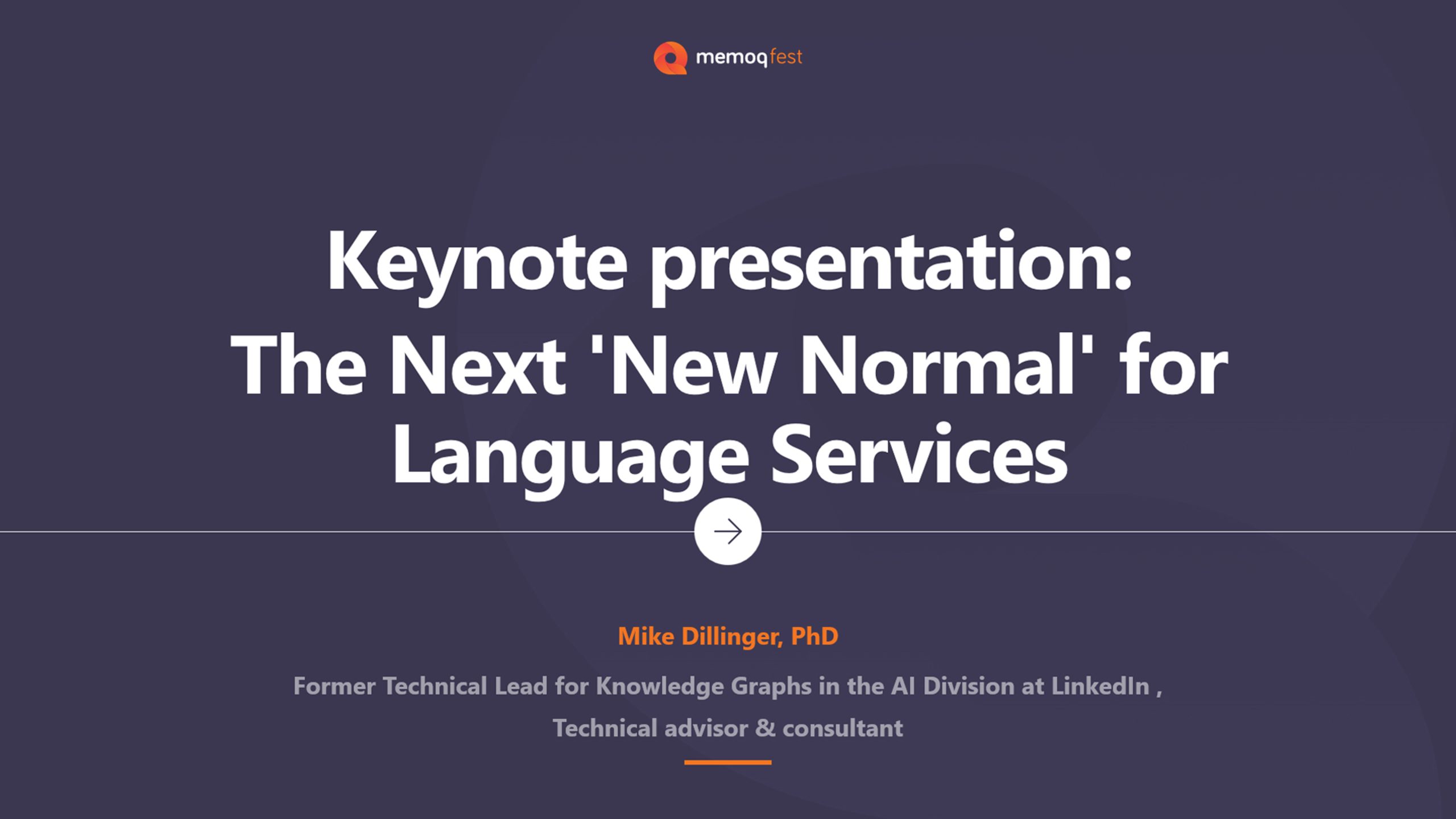Conference Program 2024
Welcome to memoQfest 2024
memoQ Progress Report
memoQ co-CEO, Peter Reynolds, will give a progress report on memoQ’s activities over the last year.
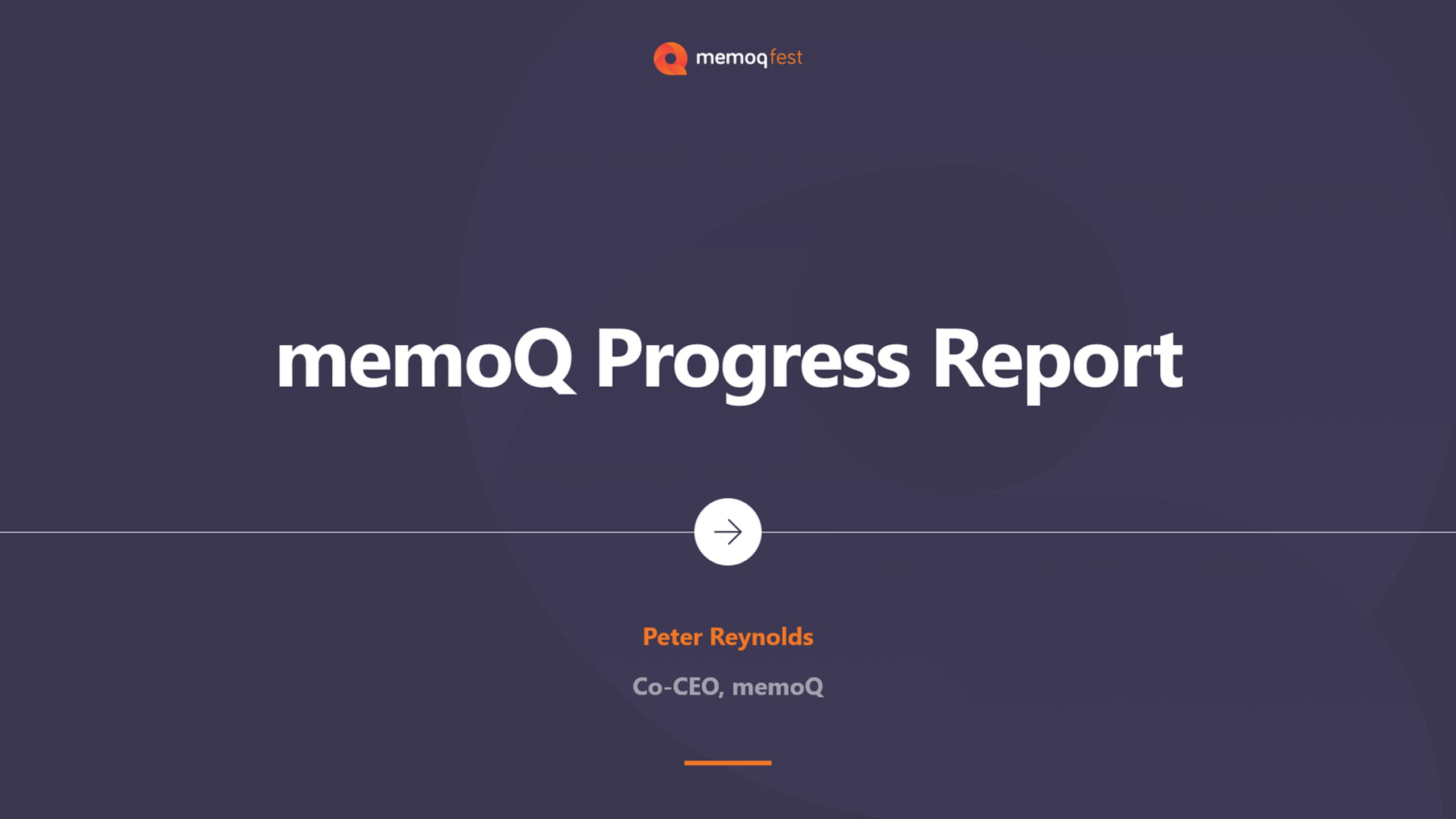

Keynote presentation: Understanding Generative AI & LLMs and their effect now and in the future on translation and localization
Neural machine translation (NMT), even with the amazing jump in quality that it brought over older MT methods, is being completely outshined by the promise of generative AI and Large Language Models. Without a doubt, these powerful new technologies are having a dramatic impact on the work of translators, interpreters, and everyone in localization. Sure, these incredibly flexible systems are limited by the amount and quality of available training data, but they’re also limited by our imaginations: after all, they don’t do anything until they get a prompt from us.
In this session, you’ll get the basics on what LLMs are and how they differ from NMT, up-to-the-minute information about how far they’ve come in the past year, and how they are being used in loc now, how they will continue to develop and further change the language services industry, and how you can choose to react to these changes.
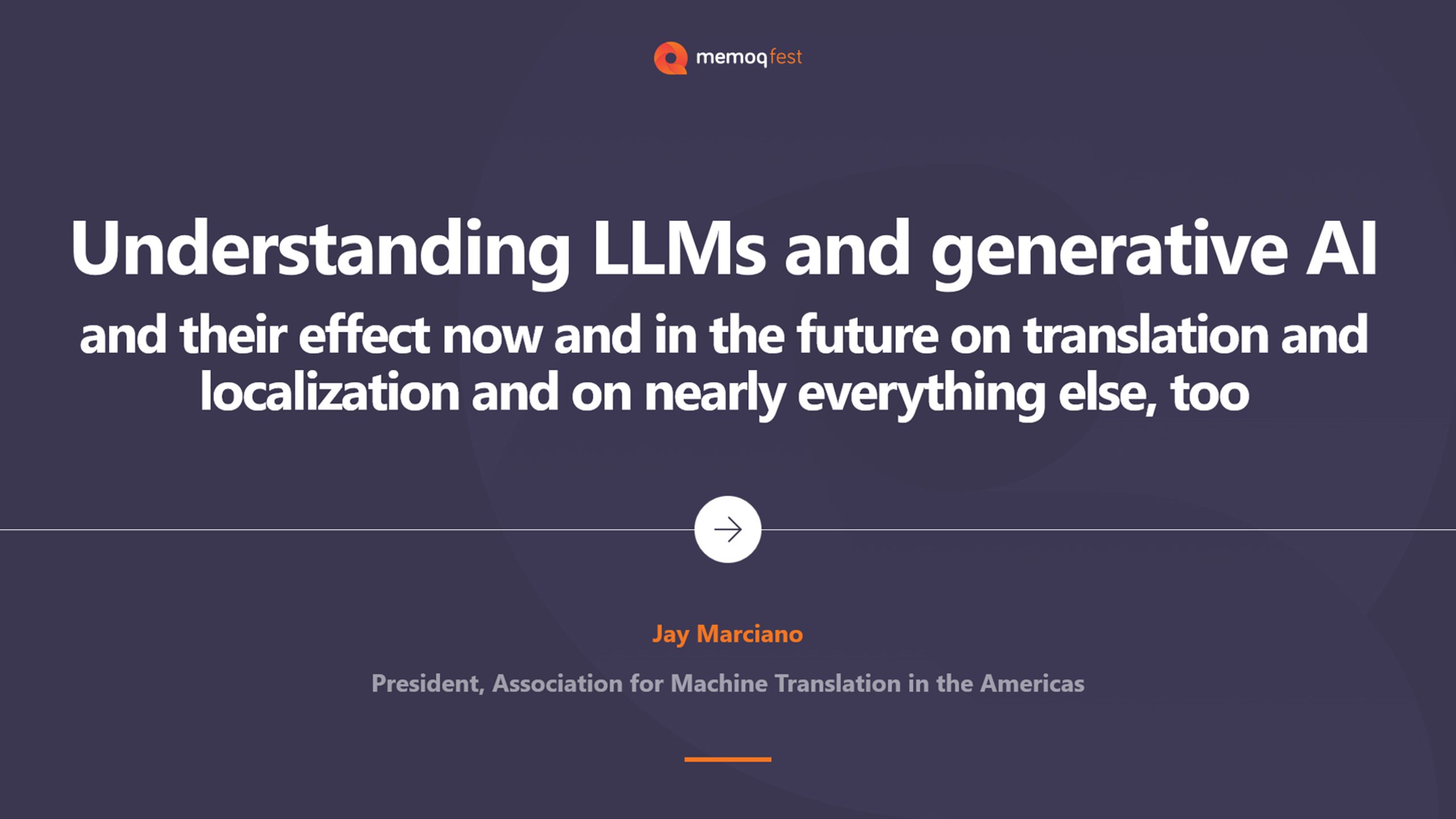

Coffee Break
AI and now what? Challenges of implementing AI in translation & localization
Today, there are new AI-powered tools and solutions popping up every day. But is the sky really the limit when it comes to their potential to transform translation and localization?
This presentation offers a holistic view of AI’s impact on translation and localization within the context of the multilingual content lifecycle. Focusing on practical use-cases, we provide insights into how AI is leveraged in fields such as terminology management, translation, machine translation, automatic post-editing, quality assurance and estimation, etc.
The session commences with a quick market overview, outlining a burgeoning landscape shaped by cutting-edge technologies.
- But how can these technologies be integrated into existing processes, and how do they change these processes?
- What is the impact on business cases and the role of stakeholders
- What does this mean for our business models?
- And does AI really hold its promises when it comes to quality?
Starting from traditional processes, we outline where and how AI technologies can be integrated, what we can gain from this and what the requirements and risks are. We further provide insights on what this means for both translation service providers and enterprise language departments, addressing the central question they are faced with today, namely, how they can stay relevant in the future.
The presentation concludes with a forward-looking perspective on how embracing AI can empower language professionals to adapt, evolve, and stay indispensable in an ever-changing and increasingly technology-centric landscape, and what the prerequisites are for unlocking its full potential.
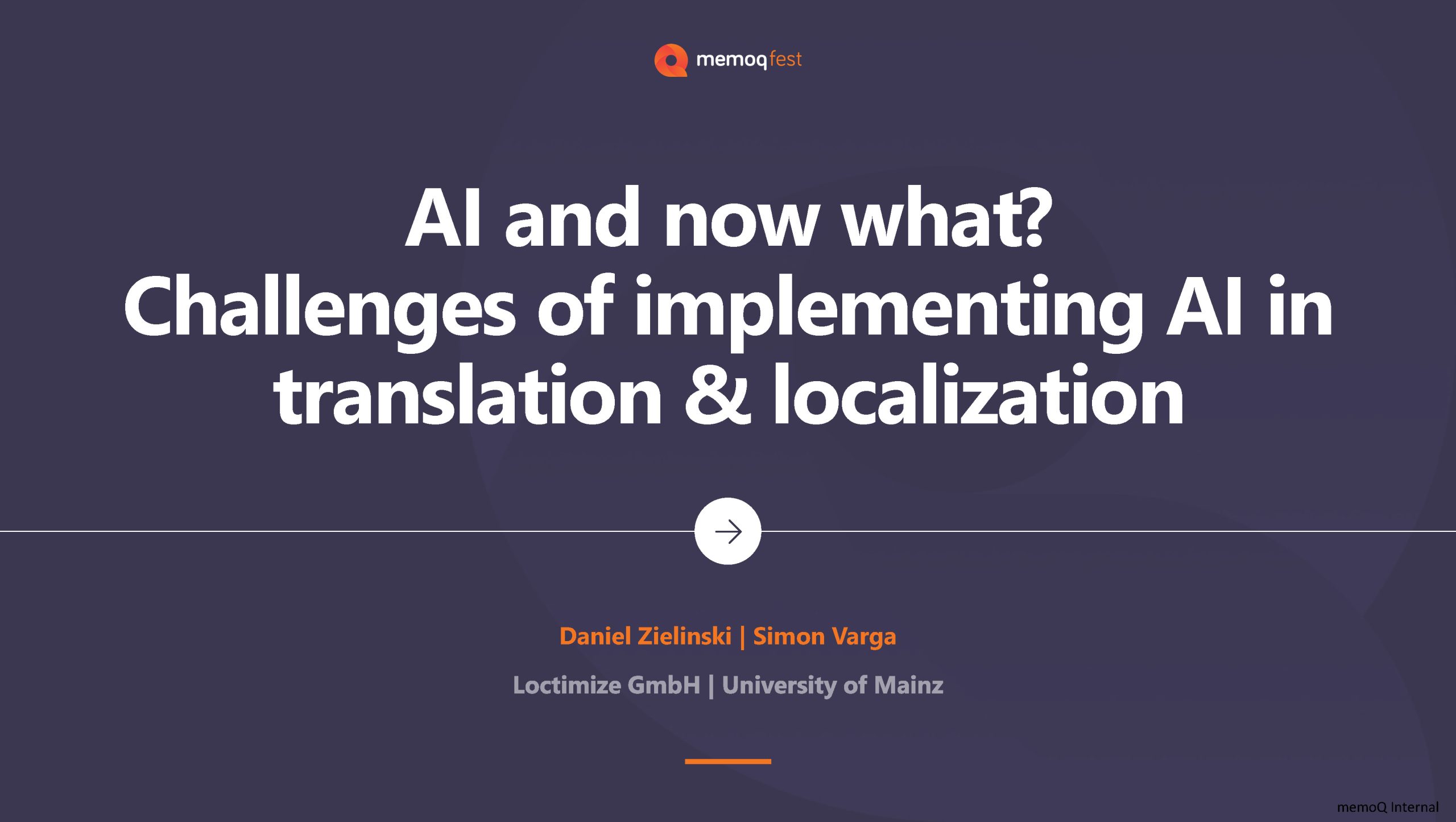
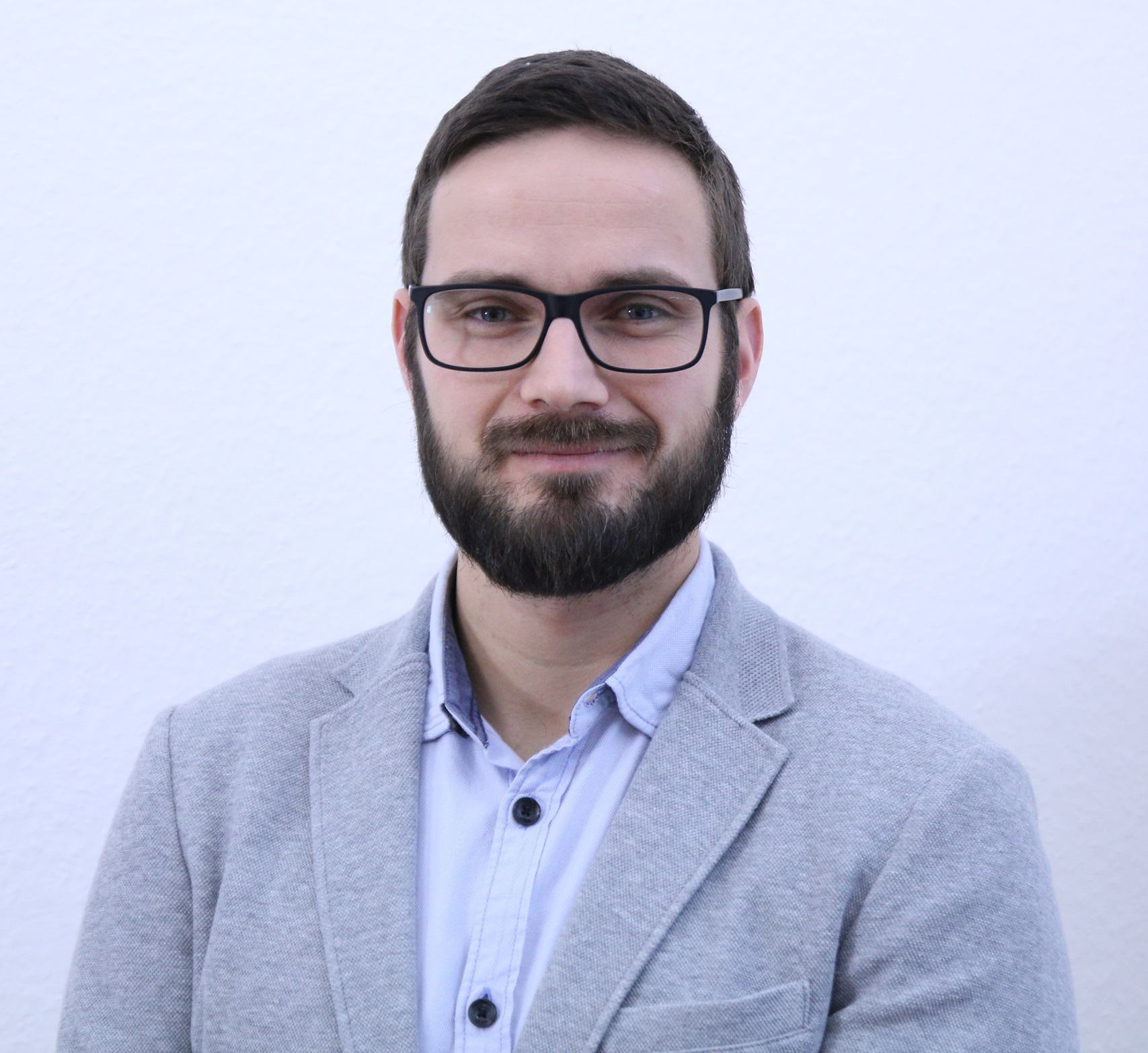
The road towards marketing localization: Centralization, automation and tailored integrations
Yamagata Europe has dedicated over two years to designing and implementing a tailored translation process for the marketing communication of our valued customer, Mazda Motor Europe.
With a strong focus on integrating different content repositories, centralizing content streams, and automating manual and repetitive tasks as much as possible, Yamagata aims to improve efficiencies for every stakeholder in the supply chain and maximize local market satisfaction.
As the central TMS, memoQ has proven to be a key success driver in this transformation process.
To increase time-to-market and minimize the risk of human errors, Yamagata has leveraged memoQ’s APIs to automate data exchange between Mazda’s marketing automation platform, Oracle Eloqua, and web CMS Optimizely (formerly Episerver) on the one hand, and memoQ on the other.
Secondly, using memoQ’s newly released in-country review tool, Yamagata manages to intensify cooperation with Mazda’s local content owners.
Stakeholders from 22 national sales companies were onboarded and supported extensively in selecting and instructing dedicated linguists representing the local markets.
Receiving their feedback in the in-country review tool enables Yamagata to maintain translation memories in accordance with their needs and provide continuous training to the involved linguists.
Finally, Yamagata relies on memoQ’s analytics and reporting capabilities to collect relevant ROI data and share valuable insights with Mazda about their marketing localization program.
In this presentation, we will share insights on the challenges faced and the lessons learned throughout our journey.
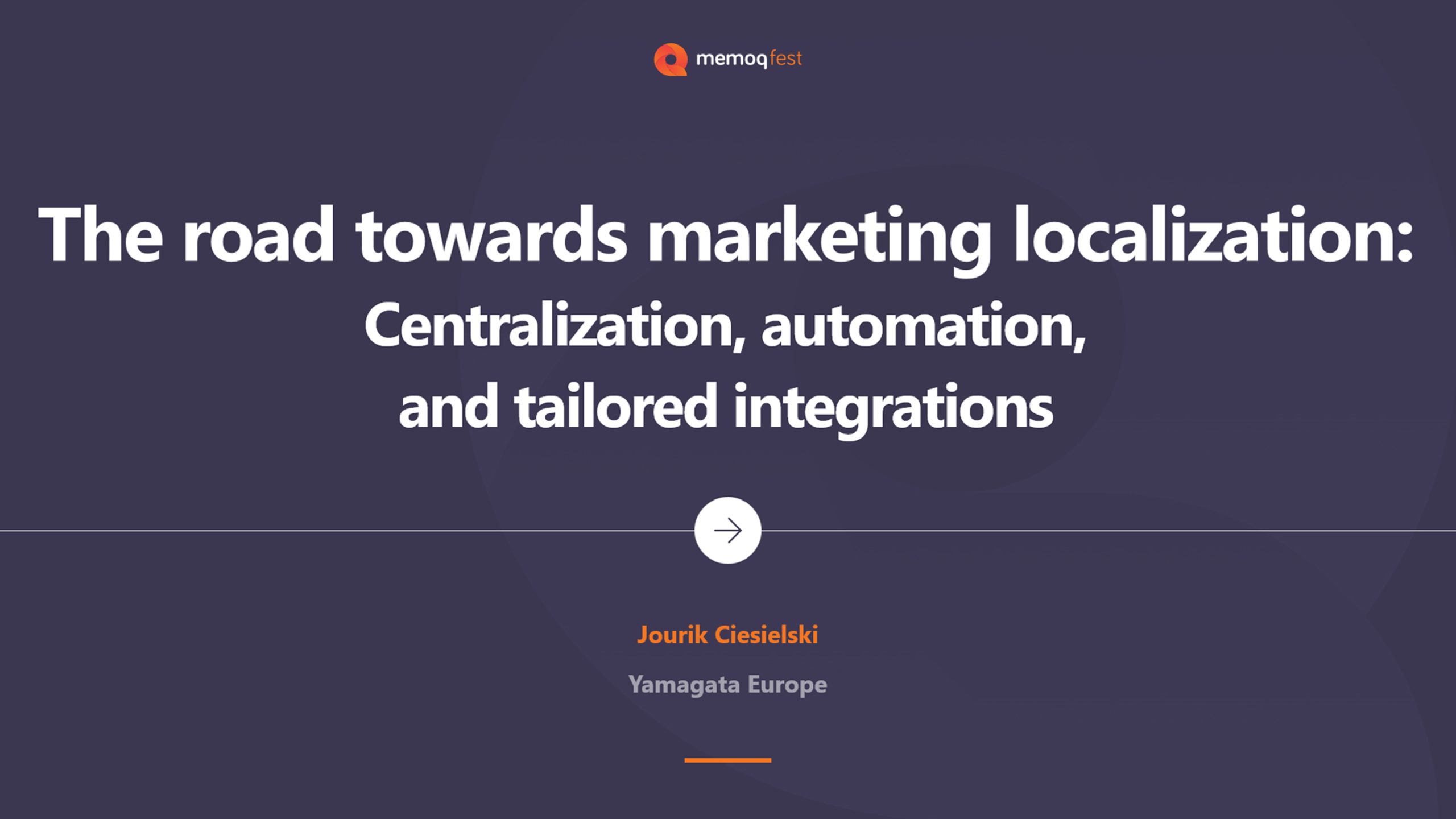

Integration Showcase | Introducing Unicorn: Can one platform support both translation and interpreting well?
See how UNICORN has evolved since last year with new integrations, interpreting enhancements, and a sandbox environment for early adopters.
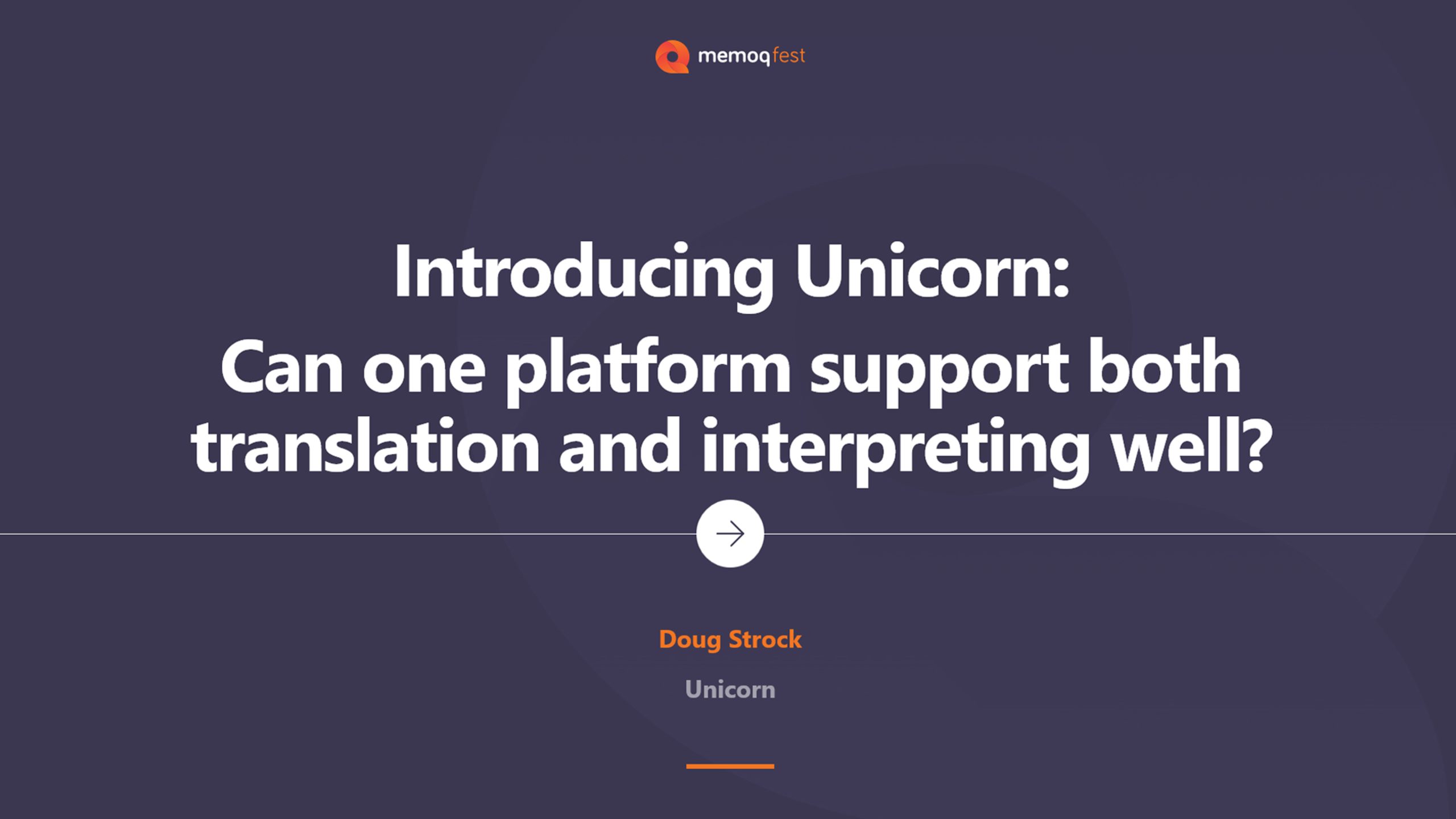

Can AI do Term Extraction as well as humans?
When AI became commonly available, many suggested that it would be suitable to do Term Extraction, a task that otherwise would take a human translator or terminologist a substantial amount of time.
The question that had to be asked is not whether it can do it, but whether the AI can do it as well as a human. To answer this, we set up an experiment, which we believe to be the first of its kind in several ways, asking five translators to extract terms from a corpus of software strings, and then asked eight different AIs to do the same, turning the general guidelines into prompts.
The outcomes of the experiment were baffling and raised more questions. I am going to share the findings of this ground-breaking study with you.
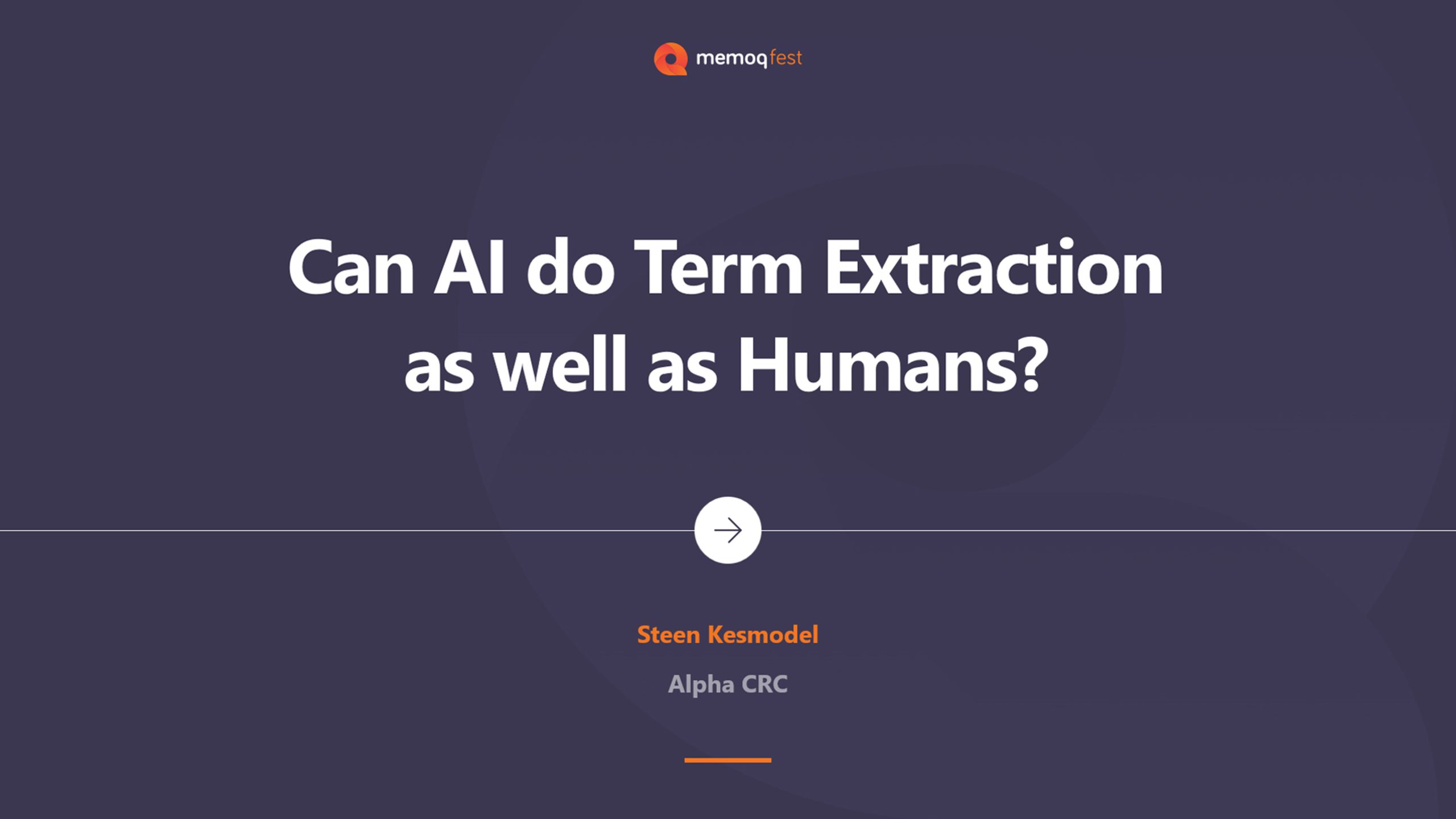

Optimizing translation workflow: The Dynamic trio of memoQ, AI and Stream Deck
In the ever-changing field of translation, achieving both efficiency and accuracy is vital. This presentation promotes an innovative collaboration between memoQ, Artificial Intelligence (AI), and Stream Deck. Together they form a powerful trio that enhances and streamlines a translator’s workflow.
At the heart of this partnership is memoQ, a robust, computer-assisted translation environment with a range of features. It ensures consistency through translation memories, manages terminology for accurate language use, supports collaboration on team projects, and allows for customisable workflows. In essence, memoQ is the key to increasing productivity, maintaining translation quality, and facilitating efficient collaboration.
The infusion of AI introduces new and enhanced capabilities such as alignment, term extraction, simplifying complex text for optimal use of machine translation (MT), clarifying poorly written source text, and providing thesaurus functionality. AI greatly enhances the translator’s toolkit, covering tasks such as writing regular expressions, checking grammar and spelling, translating poetry, and defining terms in context.
An essential part of this power trio, the Stream Deck orchestrates seamless interaction by providing customised shortcuts for quality assurance, translation environment functions, and speech-to-text transcription. Its utility extends to programming buttons with common steps, speeding up file management, and creating customised work profiles for different tools or clients.
The Stream Deck becomes a central hub for those navigating different translation environments, providing a consolidated platform for automating work and actions.In summary, the integration of memoQ, AI, and Stream Deck represents a paradigm shift in the translation landscape.
Beyond their capabilities, this synergistic harmony enhances the translator’s capabilities by providing a comprehensive and dynamic workflow solution. Through this collaborative approach, we envision a future where translation efforts are characterised by unparalleled efficiency, accuracy, and adaptability.
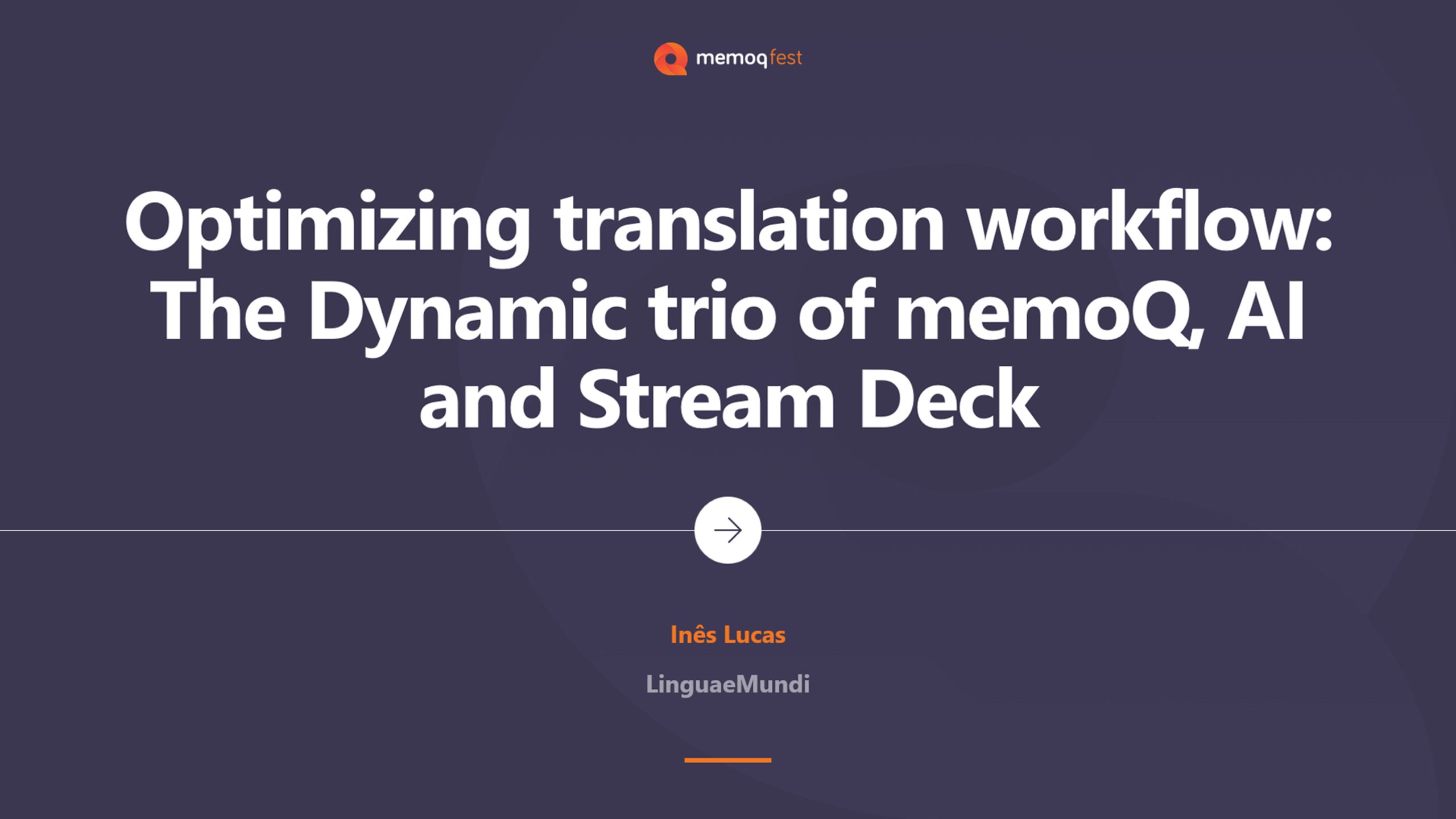
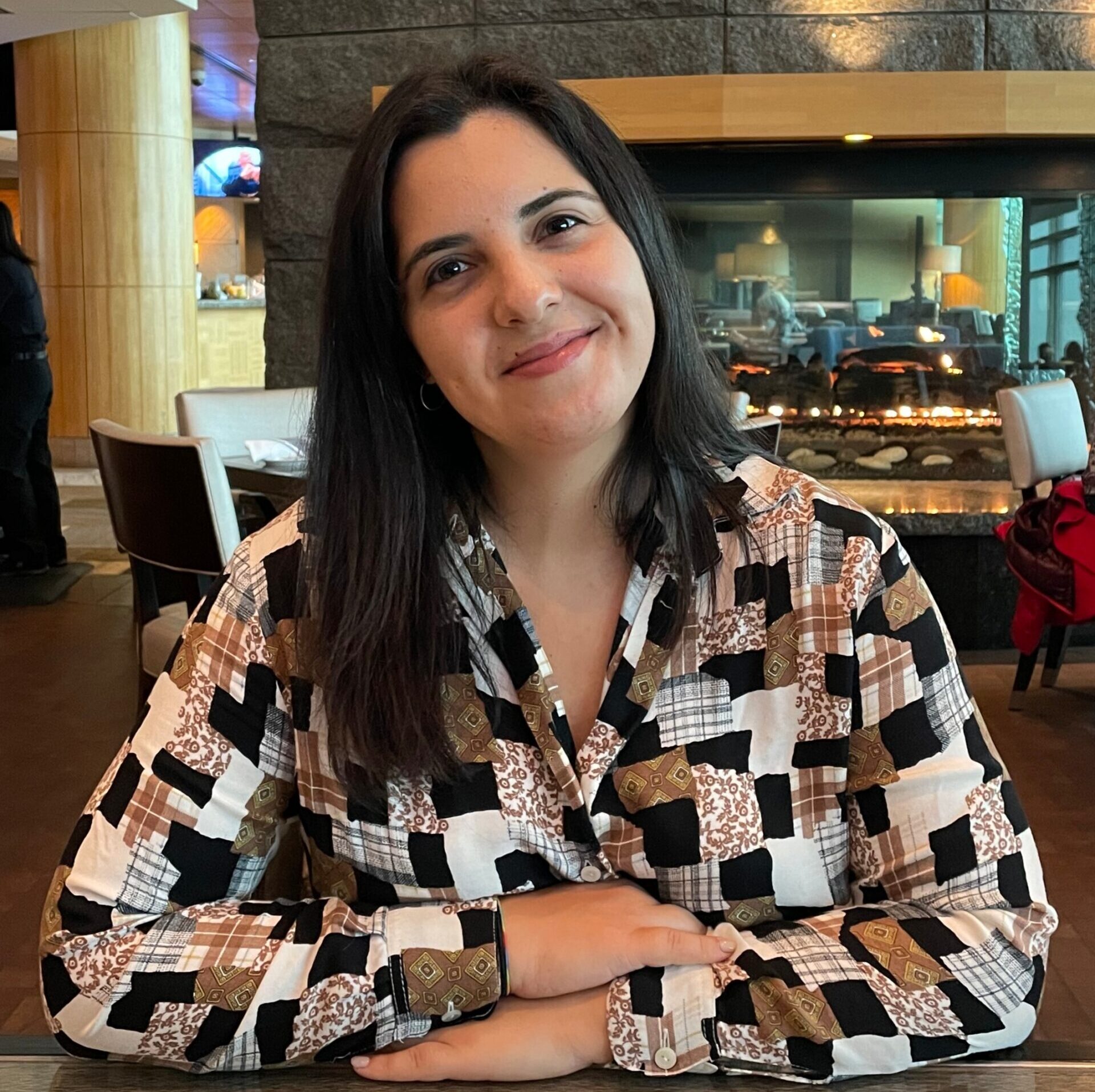
Taking the Pain Away. Take one memoQ API (and some other ideas) and call me in the morning!
Working on large multilingual projects, with requirements for life sciences clients creates a unique set of process challenges.
To deal with these challenges Conversis has implemented many solutions using the memoQ API and project templates, as well as solutions using small tools developments (using regular expressions) and custom filters.
In this presentation Ian will show some of the major challenges faced and the solutions they implemented to solve them. With the hope that they may inspire you in your own endeavors.
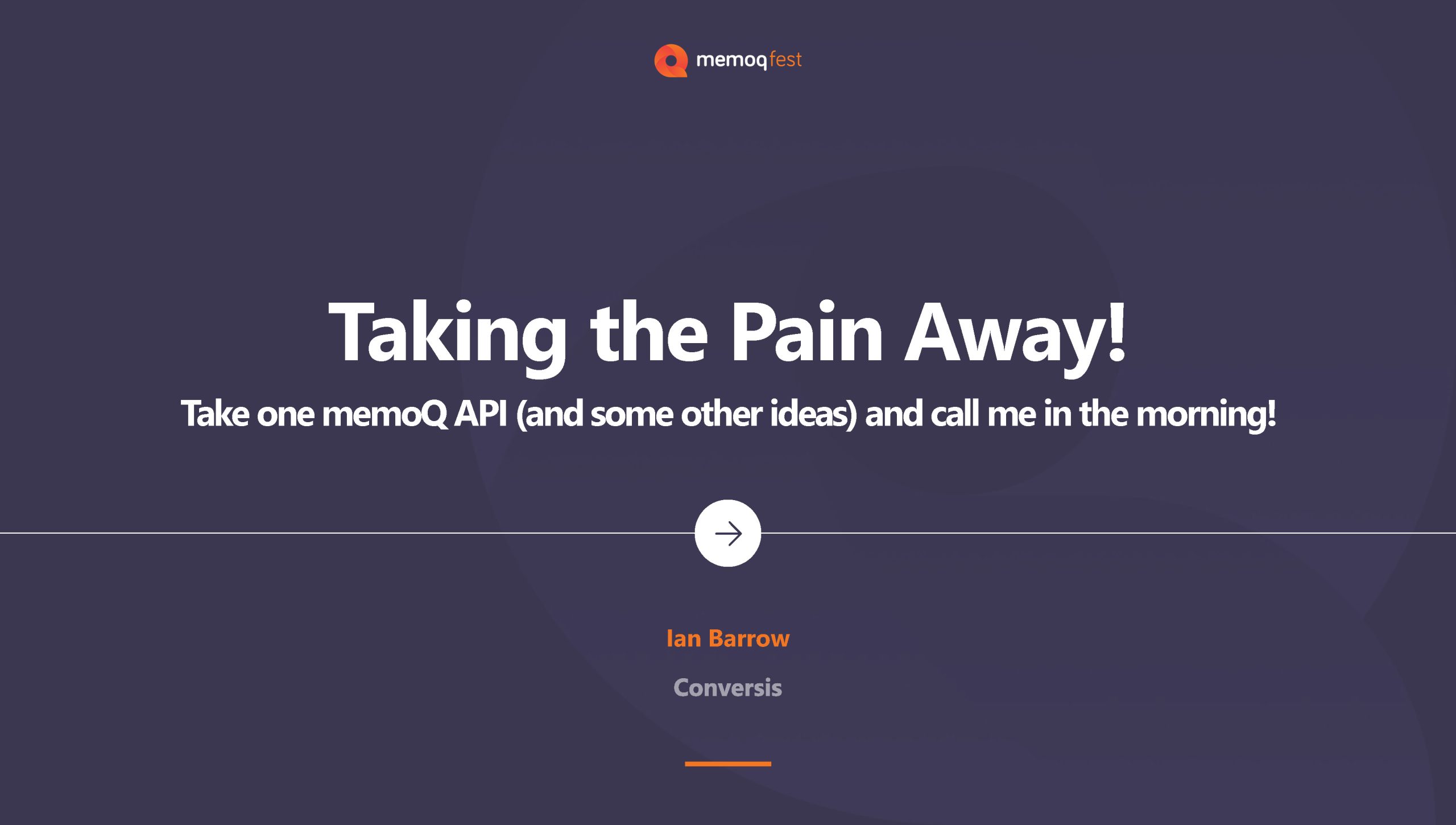
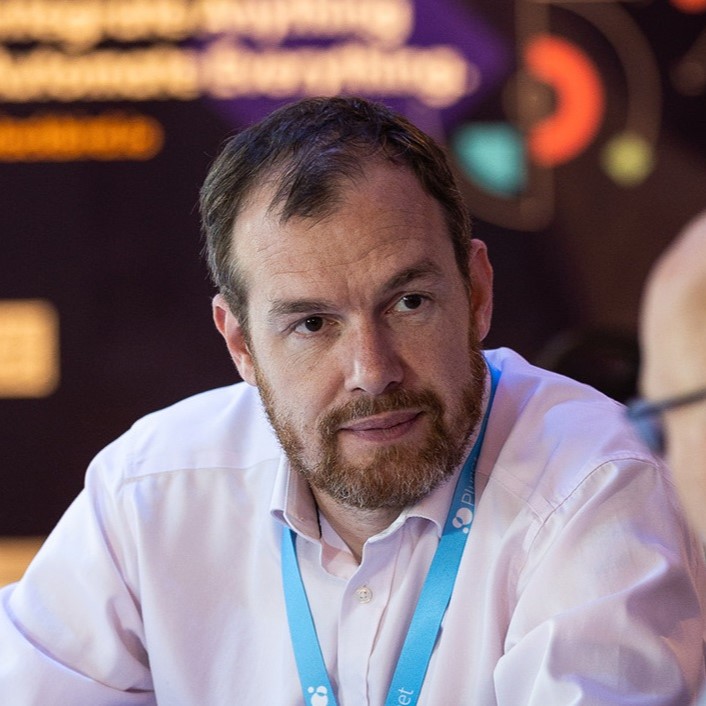
Integration Showcase | Supporting linguists in terminology research and AI output verification: automated text search in reliable EU databases with the Juremy-memoQ integration
In specialized fields like legal translation and EU institutional translation, the verification of the AI output based on reliable databases is an essential but often time-consuming task. The translated text should comply with requirements like consistency, accuracy, correct terminology and referencing, where the role of human expertise is unquestionable.
The online tool Juremy.com was designed to support precisely this workflow by providing instant contextual search results on large databases of EU documents. The tool brings fast bilingual segment hits in EUR-Lex and IATE in all 24 EU languages.
As a result of a recent development, an integration of Juremy and memoQ is already available for users. This new feature can significantly speed up terminology research, and thus increase productivity and translation quality.
In this presentation we will demonstrate practical examples on how the Juremy plugin speeds up terminology research by enabling memoQ users to carry out multilingual text searches in official EU resources.
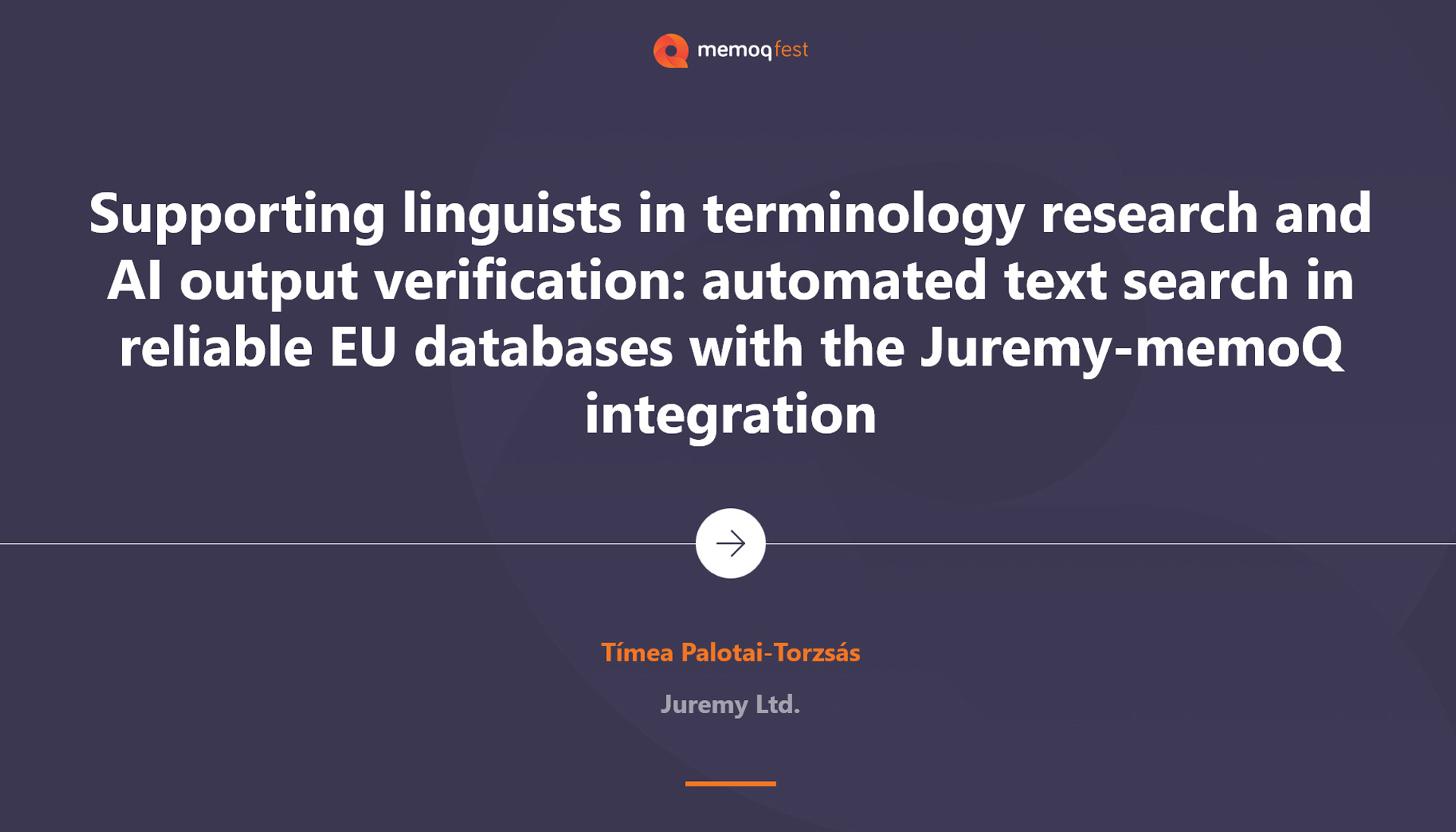

Pseudo-translation: What will happen to my document?
Pseudo-translation means testing the translation process so that you can have an idea what will happen to your files.
Originally designed for software localization to make sure the translated text can be displayed correctly in the target language and fits the available space, pseudo-translation also helps to find hard coded text, i.e. text that the translation tool would not be able to extract for translation.
For other file formats, like PowerPoint, Word, InDesign, it can be used to find areas where non-importable text appears for example on images or in diagrams.
In addition, it can help to check your filter settings, especially XML and text-based filters, and make sure all translatable text is imported for translation and the text length settings (for text expansion) come in handy when you want to whether layout changes might be necessary after translation.
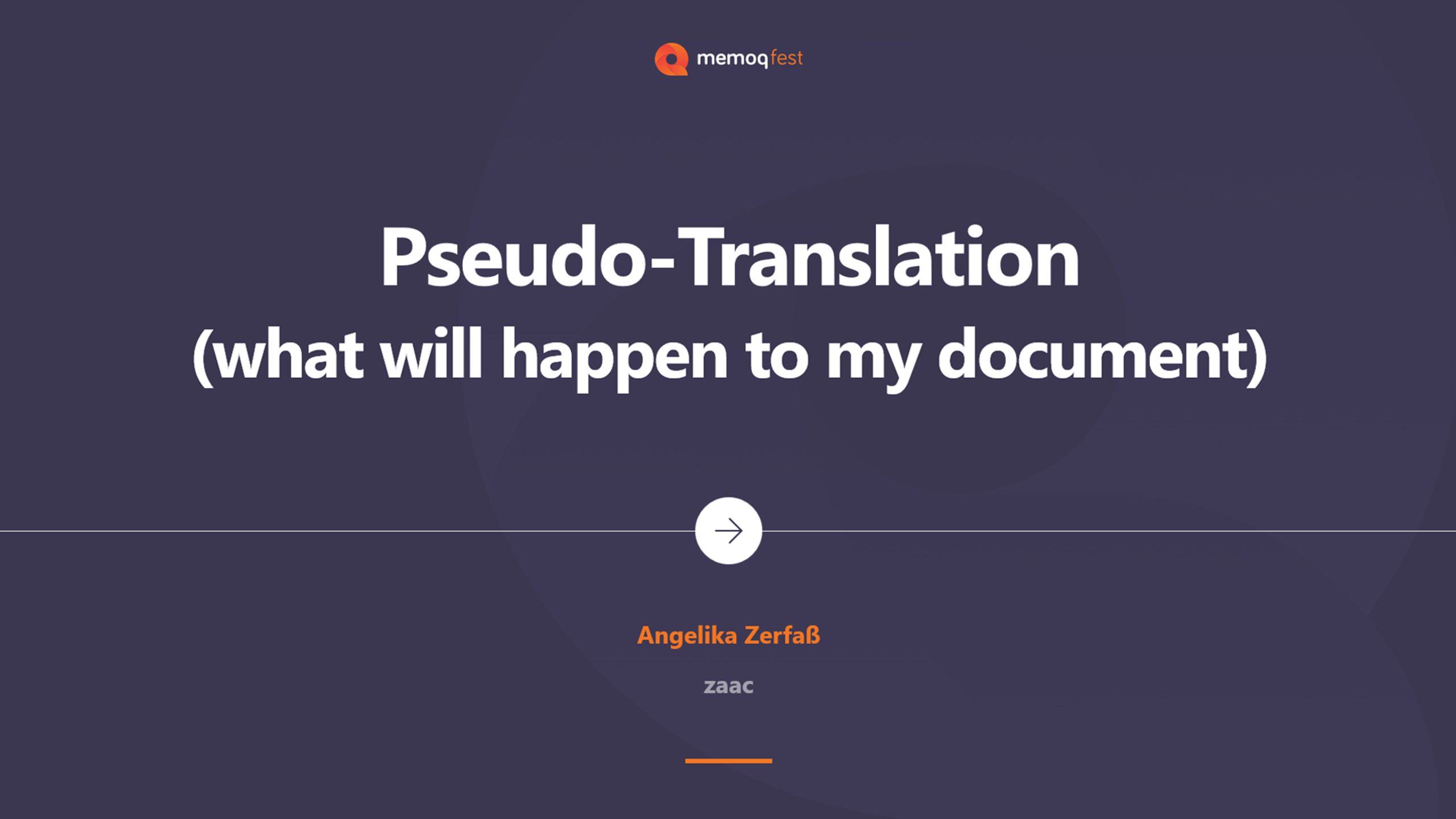

Beyond the Buzz: A journey into real value with Generative AI
In this talk we hear from Benjamin Warren, Language & Translation Office Manager at Amadeus, who will share some insights from the exploration that he and his team undertook to examine the best course of action from various generative AI options at Amadeus.
You’ll hear more about what worked, and what didn’t, as they tried to understand how they could find real value from this much talked about technology.
We’ll look into the tests that were done, the results, and ultimately the choice that was made to deploy generative AI into their memoQ workflows.
Discover how they established the value that they wanted to find and how they measured its effectiveness as part of their program. We’ll look at the steps taken and how they made the journey from testing to production.
Those that attend this talk will come away with real-world examples of how generative AI can bring value to enterprise localisation programs and share some valuable ideas on where to start your own exploration.
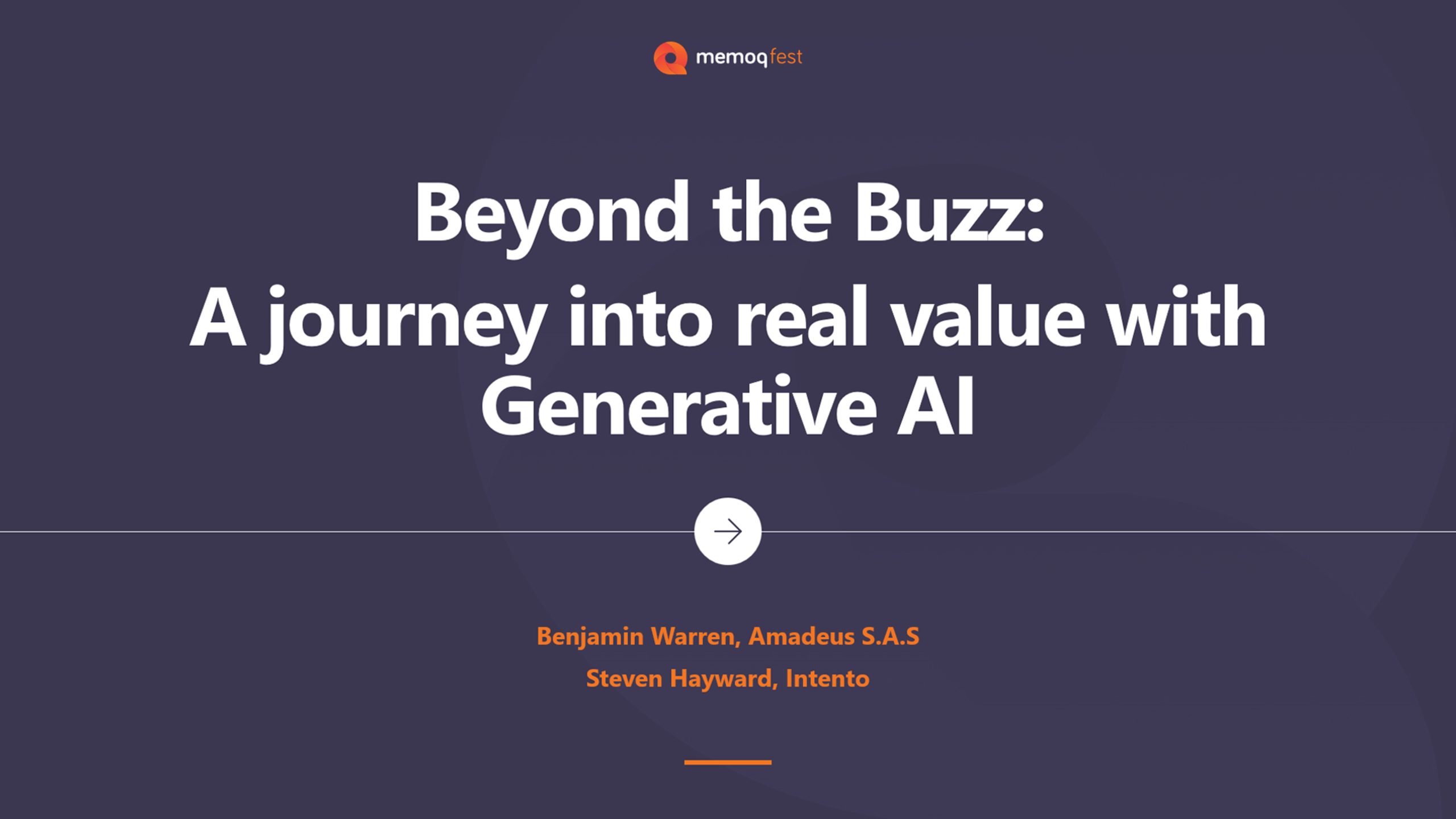


Words in Flux: How AI is Rewriting the Language Industry
In the Language Industry, the term ‘disruption’ is commonplace. We’ve heard it for decades and have become somewhat resistant to it. Despite this, we often consider the industry resilient, having weathered the global financial crisis and COVID-19. However, the advent of AI is raising new concerns. Will AI fundamentally alter our work, and will the profession of translation vanish? This presentation aims to address these questions and explore how AI will transform our lives forever.
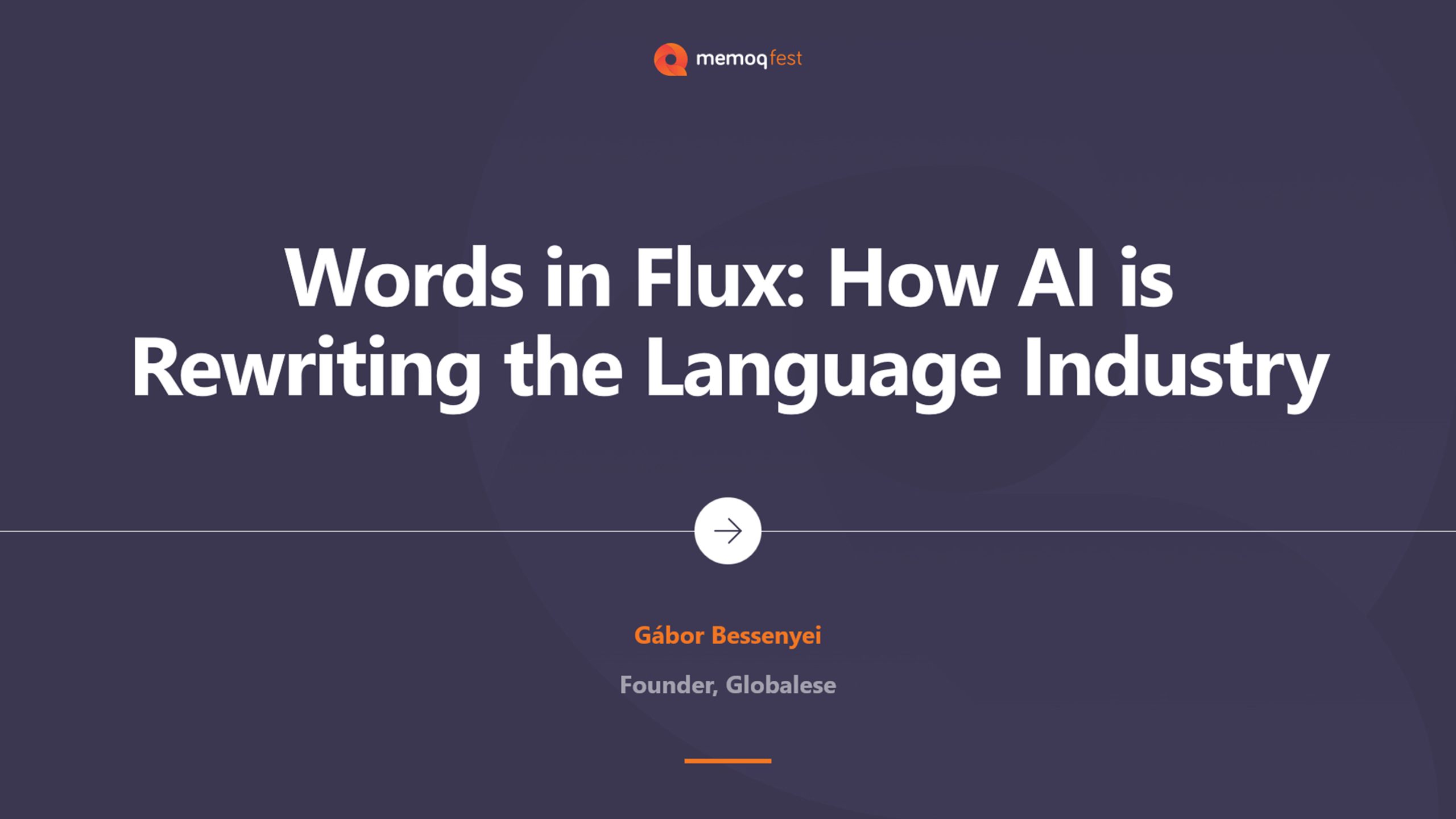
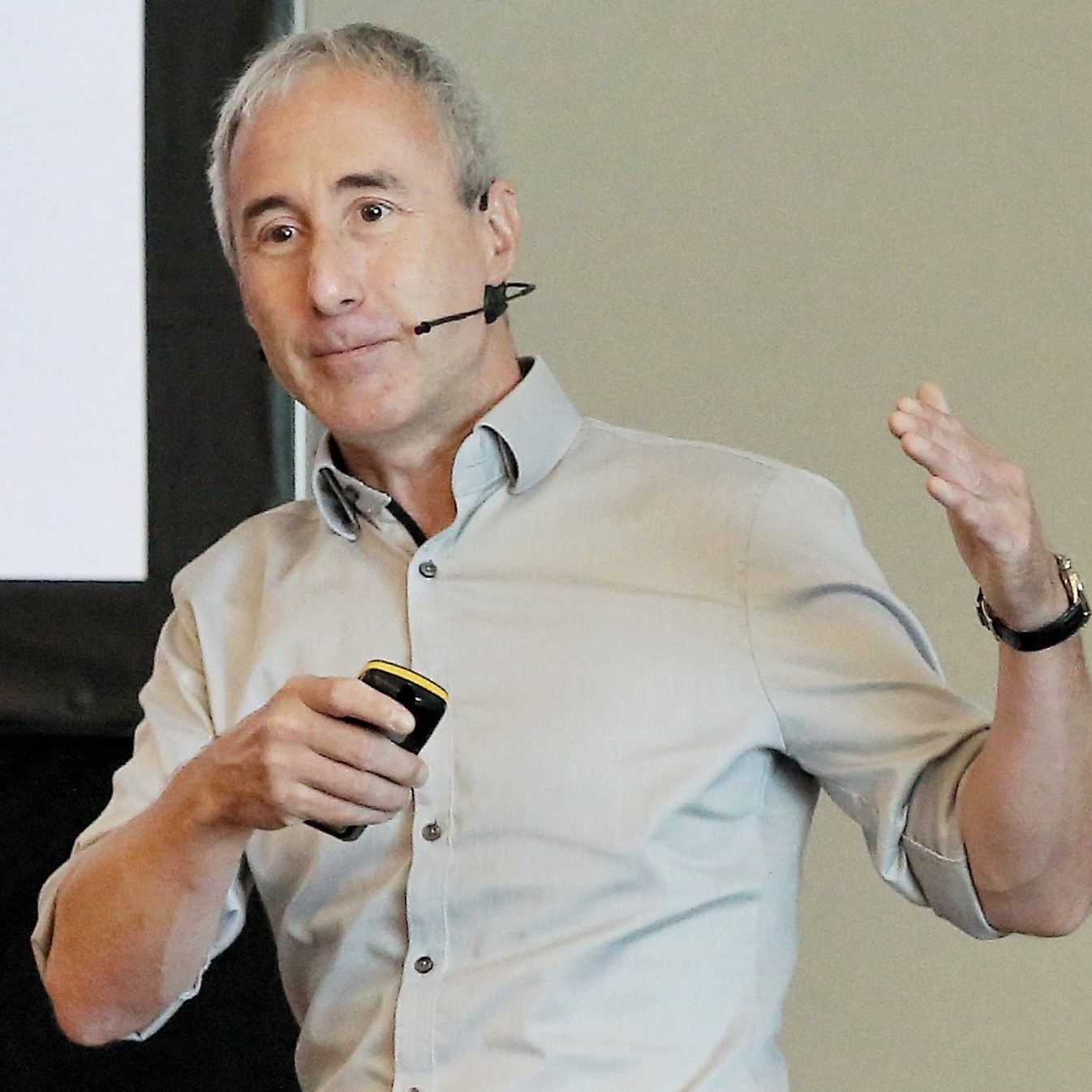
Integration Showcase | Optimizing Translation Workflows: Automated Project Roundtrip in Plunet
Join us to explore different use-cases for the seamless integration of memoQ and Plunet, creating fully automated project roundtrips. Learn how to effortlessly set up projects, assign resources, and automate every workflow step. Say goodbye to manual interventions with automated quote creation, vendor requests, and assignments.
Discover Plunet’s flexible configuration options to tailor the perfect solution for your workflow. Witness the synergy between Plunet and memoQ, enhancing efficiency, reducing manual tasks, and ensuring high-quality outcomes.
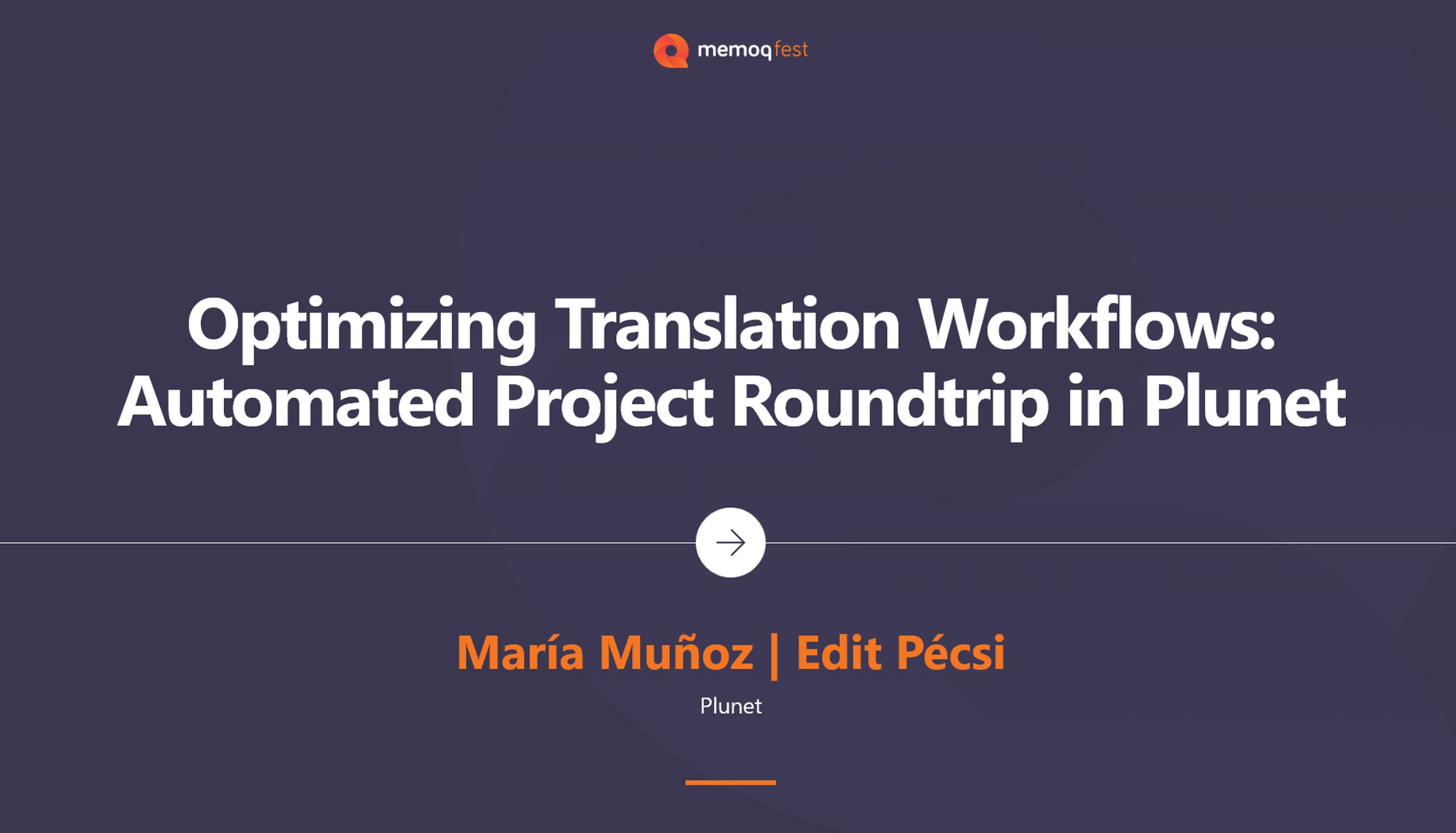


LiveDocs corpora – the ugly duckling of memoQ
memoQ is one of the very few translation environments that offers easy access to corpora – LiveDocs – that provide alignment functionality, but can also be used as a direct source of both mono- and bilingual reference for translation and concordancing. Alignment is the process of creating bilingual content from monolingual parallel documents.
Depending on the quality of the documents in question, the automatic alignment procedure can be fast and accurate or it can require a lot of time and effort. However, depending on the intended use of the aligned documents, quite often the exact, human-edited alignment is not necessary for useful results from rough, automatic-only alignment process.
LiveDocs can contain bilingual (or multilingual) resources in supported formats: it is possible to export translated, bilingual documents from memoQ projects directly to attached corpora and use them for matching and concordance in the same or other projects. This approach “freezes” the order of the segments (which is not guaranteed in a working TM) and make it possible to inspect matches in a visual context, if preview for a document was available.
Monolingual resources can also provide matches for source/target language concordancing.LiveDocs can also host any type of non-interpreted “binary” files, that the project users and download run locally. These can include, for example, PDF files, either reference source files or things like project instructions or client style guides.
Other examples include video as reference for subtitles localization, especially when combined with memoQ video preview tool.
The presentation will provide a quick overview of the LiveDocs corpora usage scenarios and how to get the most out of them.
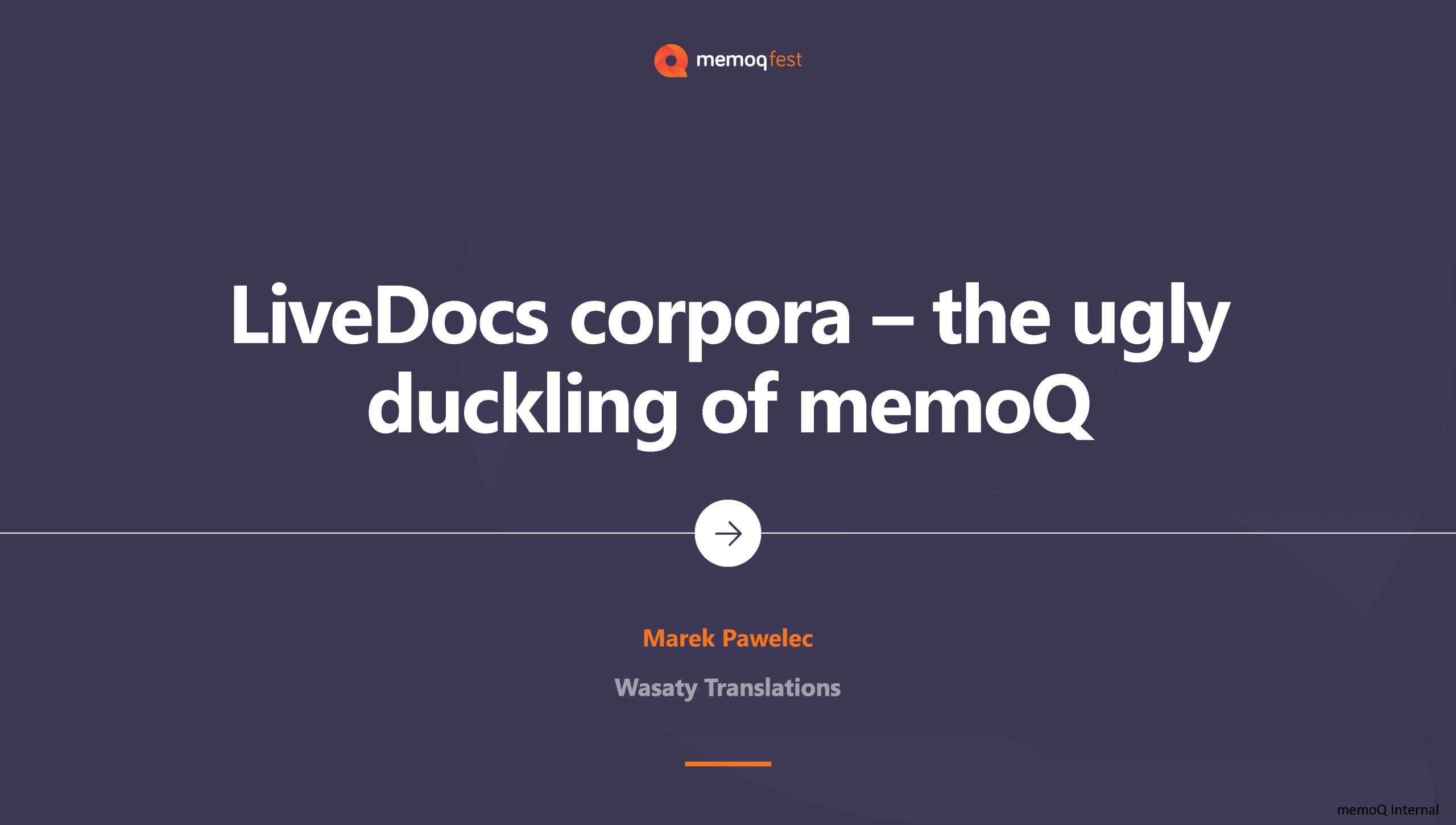

Lunch & Networking
Master Class: All you can do on the web: Machine Translation Quality Evaluation (AIQE), In-Country Review (ICR), Business Analytics (BA) and more
This master class will feature functionalities that are available in memoQweb, the browser-based interface of memoQ TMS. Many of you have been using the desktop edition of the software for ages, and had no chance to see the improvements and the productivity boosters that will make the life of project managers way much easier.
This session will
- offer a discovery ride on memoQ’s web interface
- dig deep down in PM functionalities,
- cover Business Analytics, AIQE (Artificial Intelligence-based Quality Estimate, memoQ’s MT evaluation solution), In-Country review (ICR) tool and many other topics
Target audience: project managers | Level of memoQ knowledge required: basic/intermediate / advanced
Join memoQ’s Anna Mohácsi-Gorove, Inès Berbudeau and Luz Elena Videgaray Aguilar for this session!



Master Class: Regex your QA

Master Class: Using translation project templates to automate your translation workflow
Imagine a scenario where you are in the crossfire of clients and vendors: clients want to cut costs, vendors want to increase prices, and you are here to add value for both, while optimizing your workflow and making a profit as well. Sounds familiar, huh? Templates were developed to cut down the time and cost spent on translation project preparation. This session will feature the basics of translation project templates and explain how this resource can be used to automate and further optimize your translation workflow.
Target audience: project managers | Level of memoQ knowledge required: intermediate / advanced

memoQ TMS master class for language engineers & power users (Part II)
The masterclass on TMS/server optimization at the memoQfest 2023 provided a good opportunity for advanced server users to meet and discuss various performance issues with memoQ’s developers.
The goal of this session would be to follow up on the issues discussed last year and provide a forum for server managers to share insights and discuss persistent challenges with the developers.
Highlights
- Presenting some practical tips and tricks that others might benefit from
- Discussing issues and requests with memoQ’s production team
- TM+
- Background tasks and queue revisited
- Questions about upcoming changes
- Discussion on missing features or features that need improvement
Target audience: server administrators, language engineers, power users

Coffee Break
Introducing Breeze: A Breath of Fresh Air for Streamlining RFPs and Other Business Documents
Introducing Breeze: A Breath of Fresh Air for Streamlining RFPs and Other Business Documents
Join us for a dynamic 25-minute presentation as we unveil Breeze, your ultimate solution for simplifying complex business documentation processes. Discover how Breeze revolutionizes the way you handle RFPs, but also Security, DDQ, DEI, and ESG questionnaires, saving you time, resources, and headaches. Learn how Breeze’s intuitive platform empowers you to breeze through paperwork with ease, unlocking newfound efficiency and boosting your organization’s success. Don’t miss out on the chance to breathe easier with Breeze!
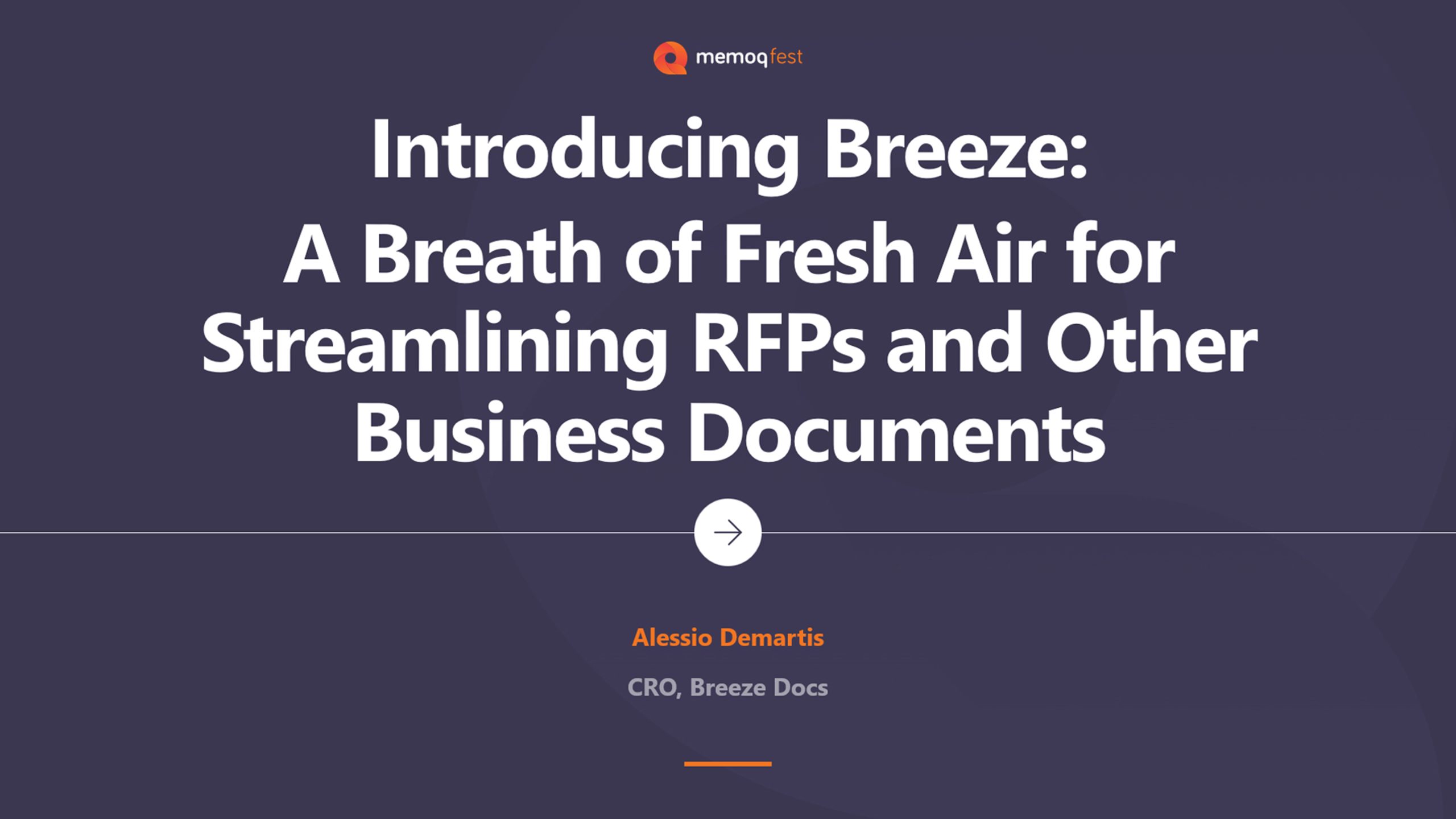

The power of terminology management: Insights from MED-EL
MED-EL is a global hearing implant company with over 2,700 employees in 136 countries worldwide. We translate materials into around 40 languages daily. As a medical device company, we are highly regulated and need to follow strict standards regarding the quality of translations–and terminology.
Due to a lack of terminology management and no centralized translation department, many inconsistencies arose, which led to confusion for implant users and professionals. Our attempts to implement terminology management in the past were unsuccessful.
This time, we established a whole team to take on this project. We needed support from an expert, our long-term LSP, for training on how to implement terminology management in our company. Together, we came up with a structure for our new TB, selected the metadata for QTerm, and established a strategy.
Let us guide you through our first steps of the terminology process from merging several TBs to setting up a memoQ project in which we imported the QTerm termbase so we could benefit from existing TMs and TBs. This is where things got more challenging.
We encountered obstacles with term IDs not matching after reimporting, images disappearing when reimporting translated XLSX-files, and forbidden and alternative terms not showing up in the memoQ editor.
During our presentation, we will go into detail about how we were able to creatively overcome these challenges, use QTerm and memoQ to their full potential, and we will tell you about our key learnings.
With our presentation, we hope to show companies, LSPs, and freelancers the value of terminology management and how much can be achieved through the right strategies, good planning, and teamwork.
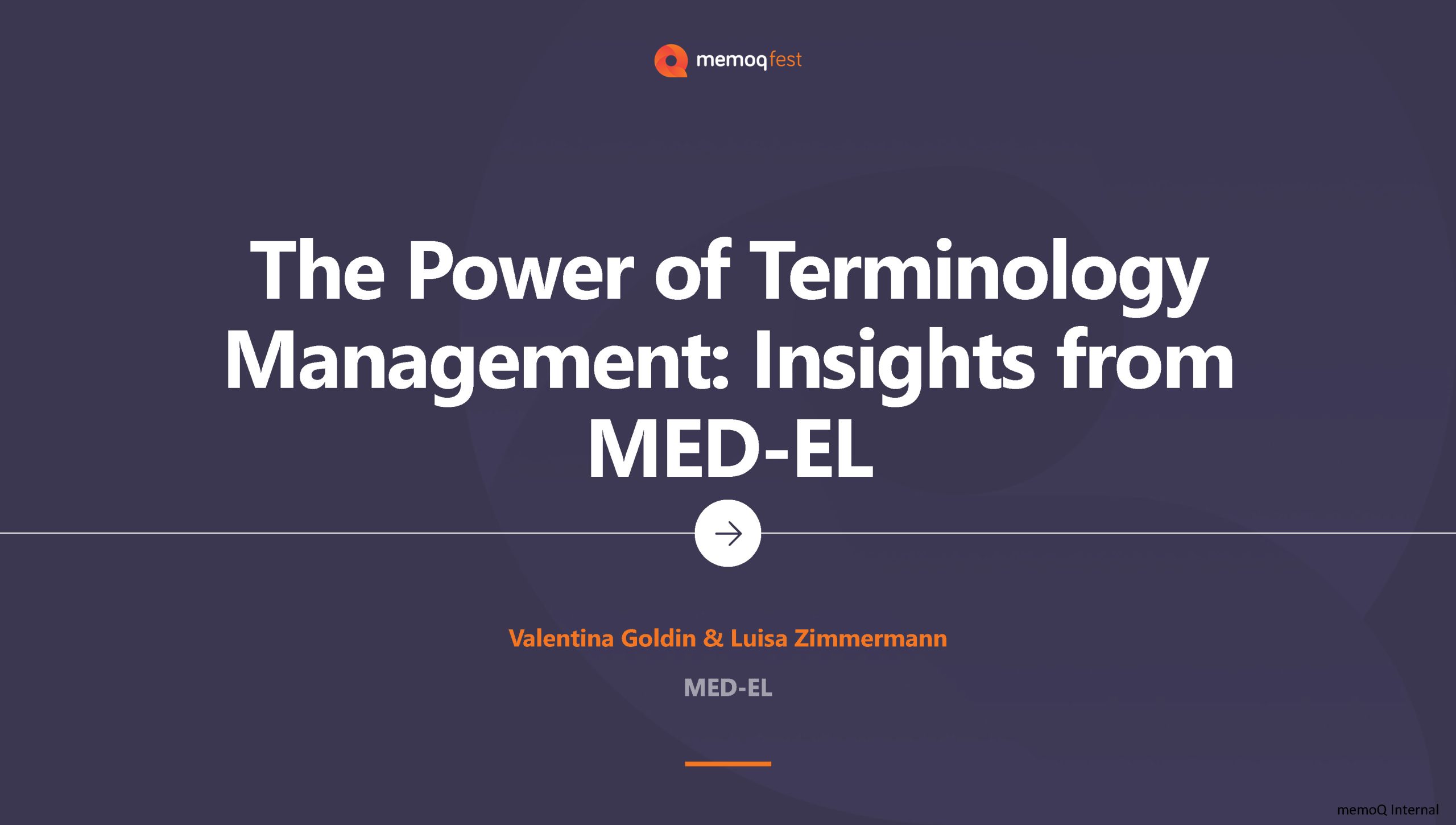
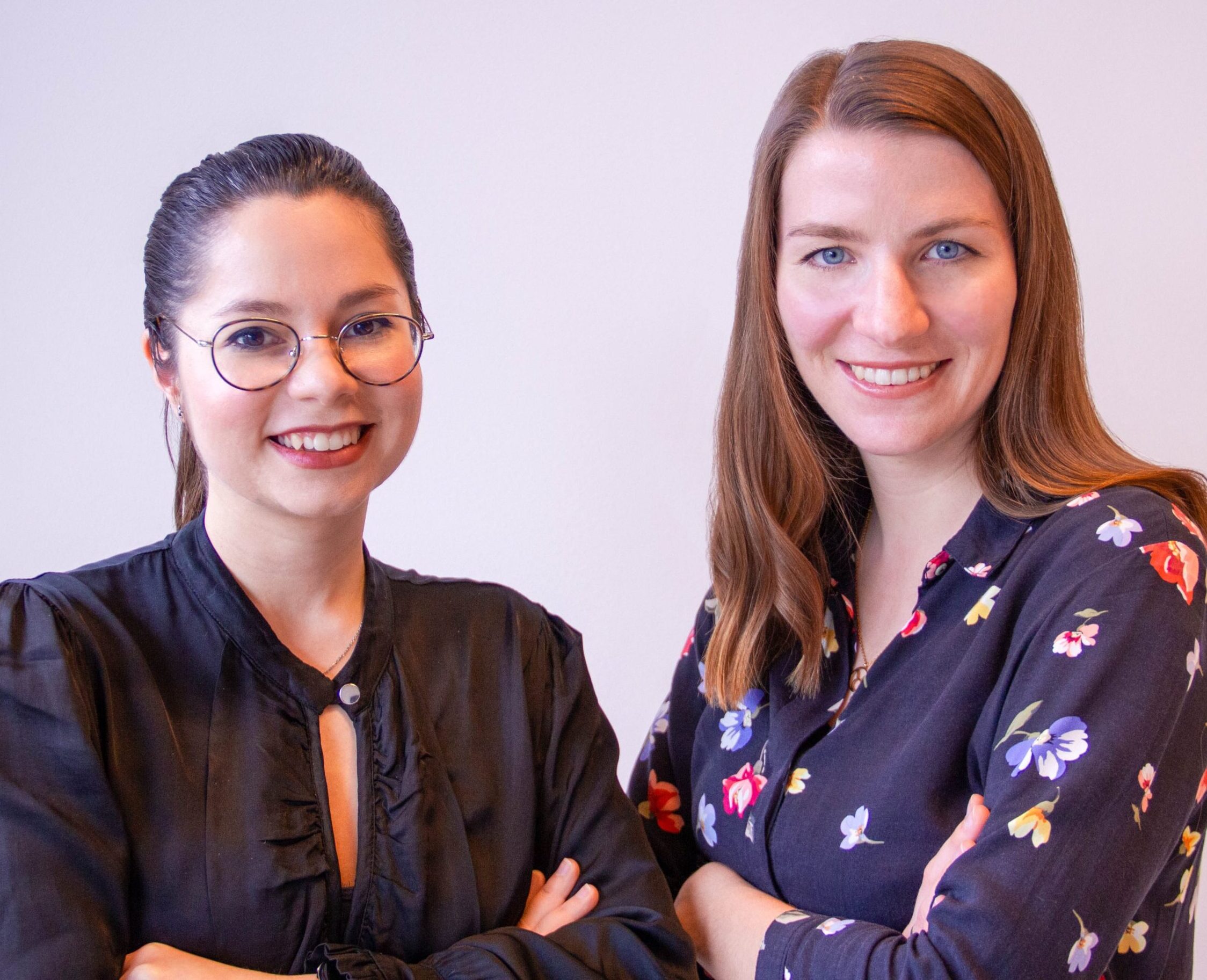
Translating Neuropsychological Assessments for Clinical Trials

Utilizing memoQ's Customer Portal for automated translation processes
memoQ’s Customer Portal offers several benefits. Most valuable for us – automatic project creation. Leveraging this feature, we established a workflow that creates projects and assigns them to translators automatically.
Graphisoft offers its Subsidiaries and Partners the opportunity to participate in a (semi-)automatic process for translating marketing materials. In this process, a marketing professional from the Subsidiary orders the content relevant to them via the Customer Portal and the files are automatically assigned once the memoQ project is created. A dedicated team of in-house translators use memoQweb to translate the materials, which are automatically sent to the Customer Portal upon completion.
Involving in-house translators adds an extra layer of efficiency, as there is no need for further reviewing of the materials.Using this automated process significantly reduces the dependency on project managers.
Besides enhancing efficiency, this workflow also marks a shift towards a more automated future.
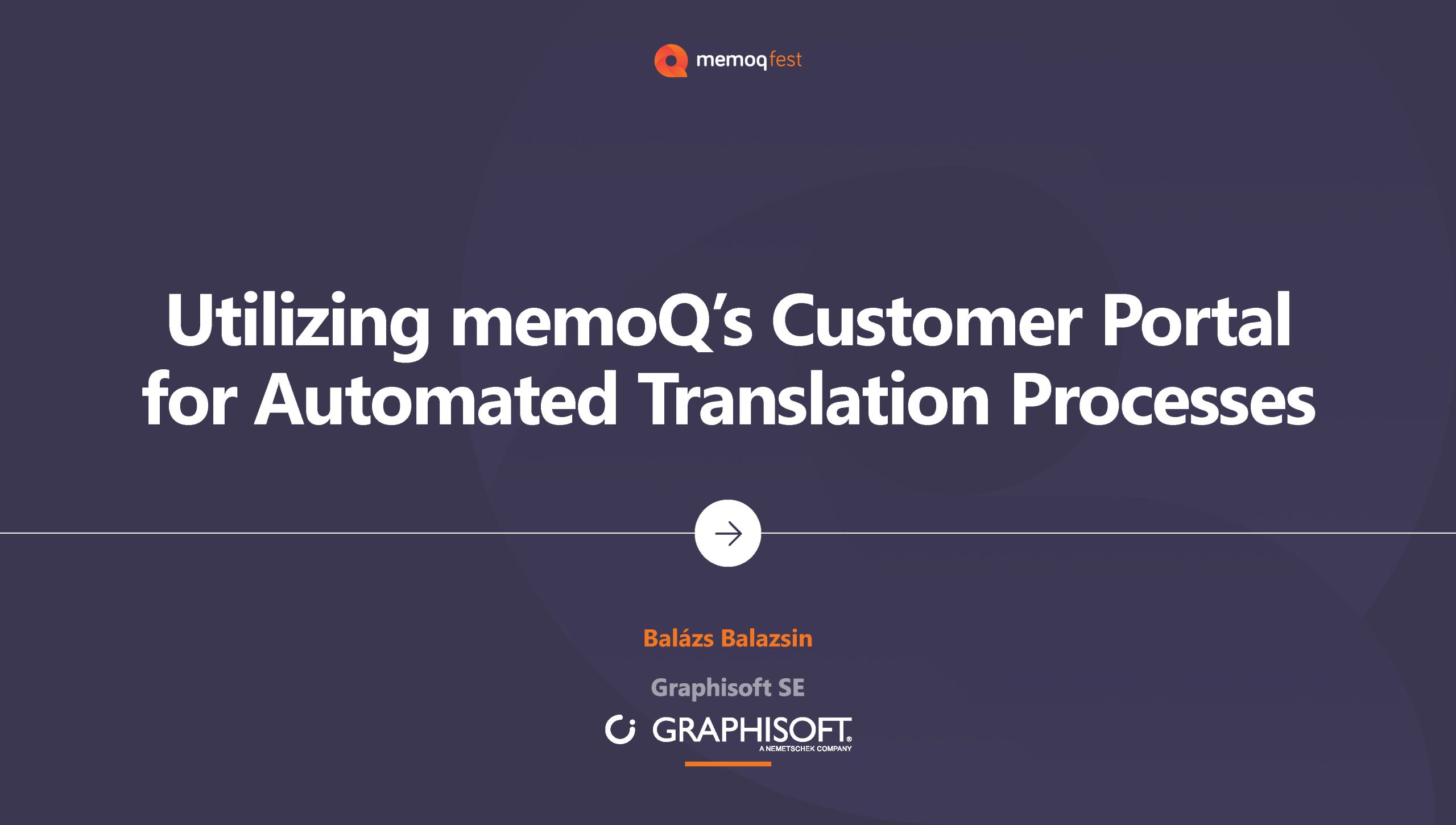

Everything you wanted to know about memoQ AGT
As a hype magnet the word “AI” often generates PR talk that’s long on vague promises but short on specifics. We at memoQ prefer no-nonsense solutions whose value can be demonstrated without buzzwords.
In this short talk memoQ AGT’s initiator will show how Adaptive Generative Translation works, how it fits into memoQ’s existing workflows, what we’ve learned in the first 6 months since AGT’s release, and what we’re working on next.
Caution! This talk includes hard numbers about quality.
Don’t get confused: the video below has been merged with the following session, that is why it’s called ‘Backstage Tour’.
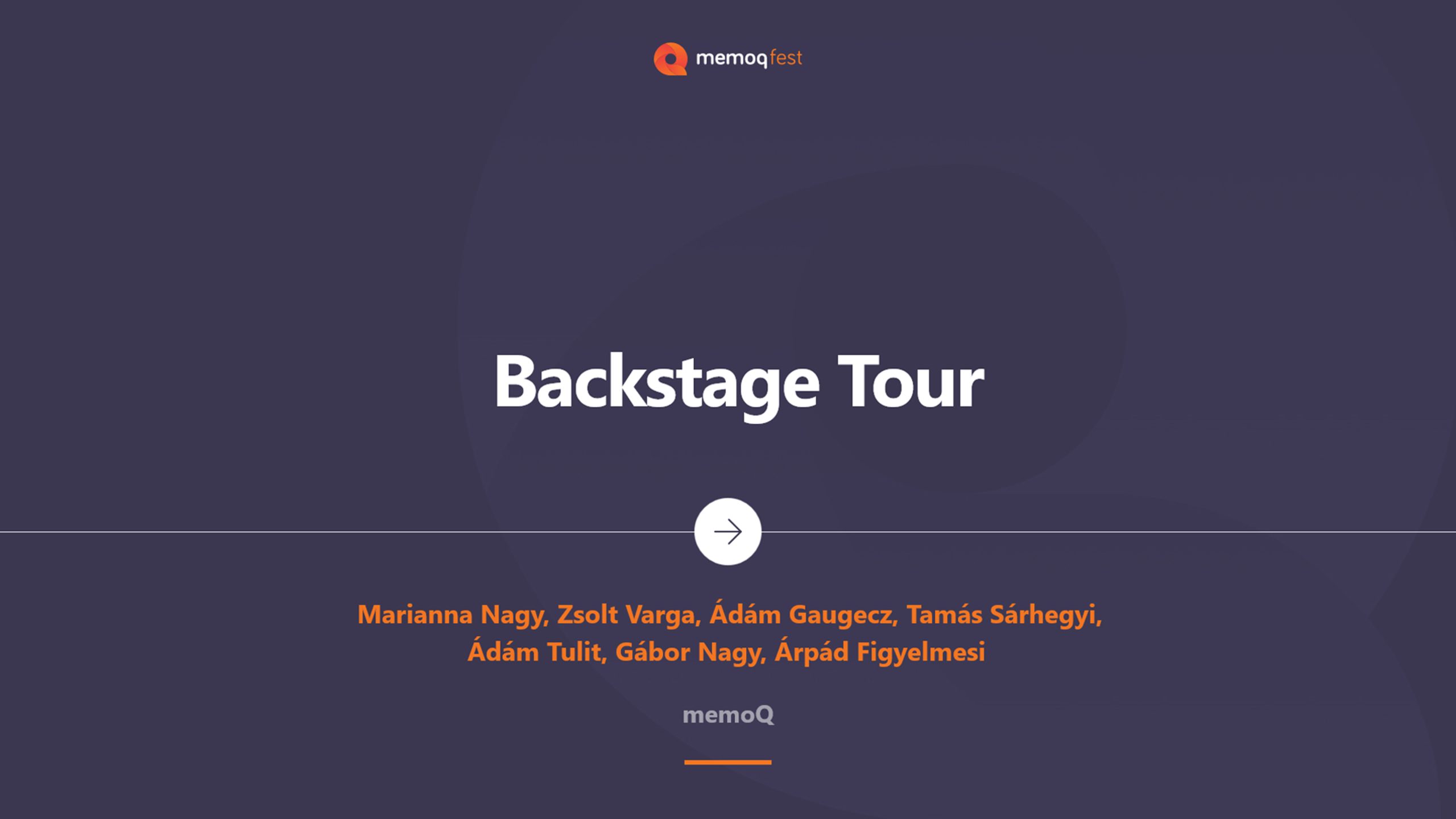

Backstage Tour with the Production Team & Panel Discussion
Let the production team guide you through the most recent developments, and get a glimpse of what’s cooking at memoQ right now.
Don’t get confused: the video below has been merged with the presentation on memoQ AGT; that is the reason why it starts with Gabor Ugray’s presentation.
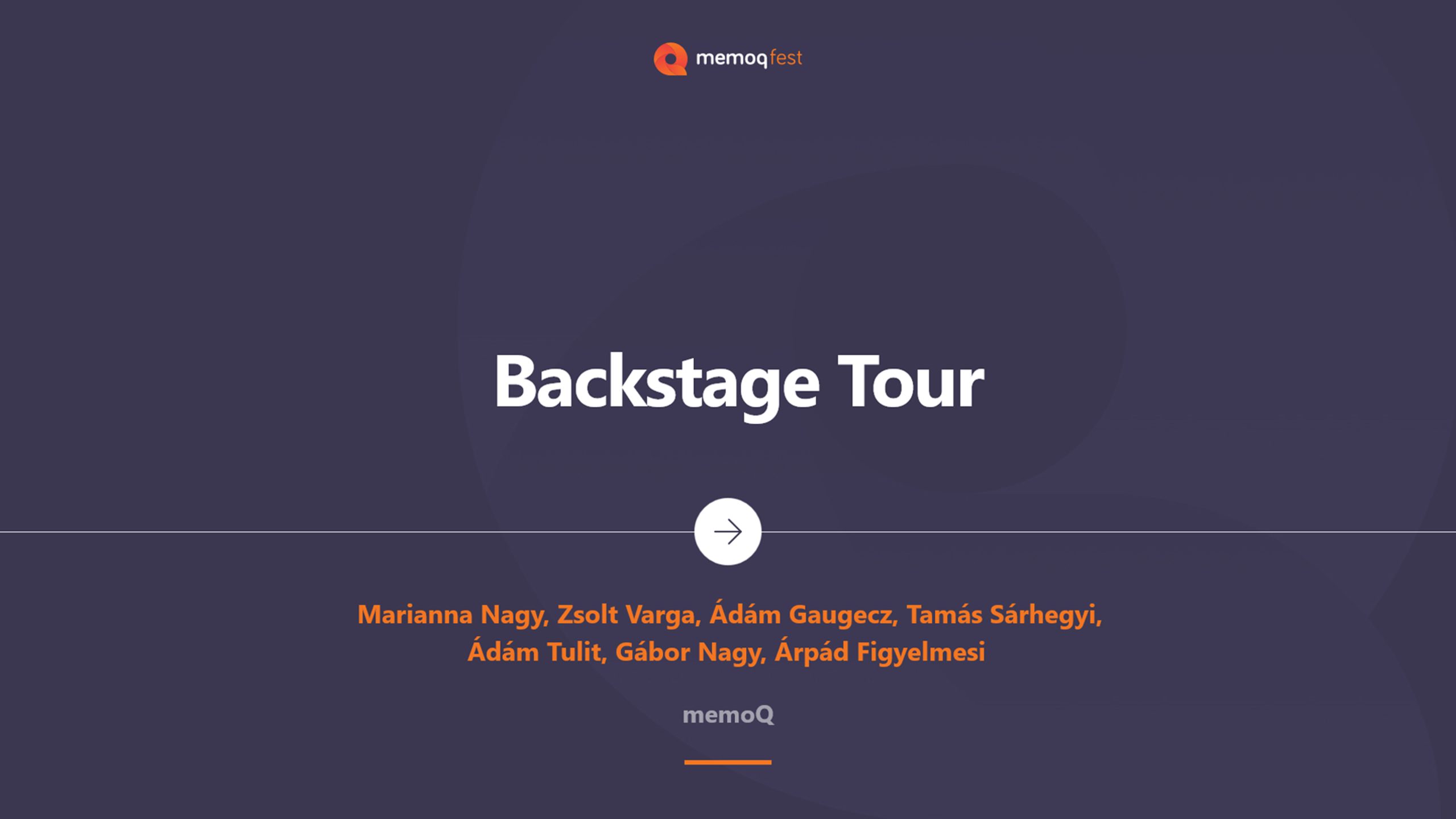







Gala Dinner
Human value in creating and improving modern localized experiences
The first quarter of the 21st century sees a transformation of what value humans will create in localization. In my presentation titled ‘Human Value in Creating and Improving Modern Localized Experiences’, I will discuss the new types of value that language specialists, SMEs, coordinators and managers can provide as AI takes over the more routine tasks.
As machine translation capabilities continue to advance, humans will need to focus on tasks requiring creativity, nuanced cultural understanding, and strategic thinking. Language professionals will play vital roles curating and enhancing AI-generated content to ensure localized experiences feel authentic to each target market. They will act as experience curators, model mentors, cultural trainers, and adaptation architects applying human judgment to tone issues that algorithms may miss.
Project managers can use their expertise to guide strategic localization decisions, select appropriate AI tools for each project, and train AI systems by reviewing and correcting initial machine outputs. By embracing AI as a productivity tool rather than a threat, the localization industry has opportunities to elevate the strategic work of humans while streamlining processes to create engaging multilingual experiences at global scale.
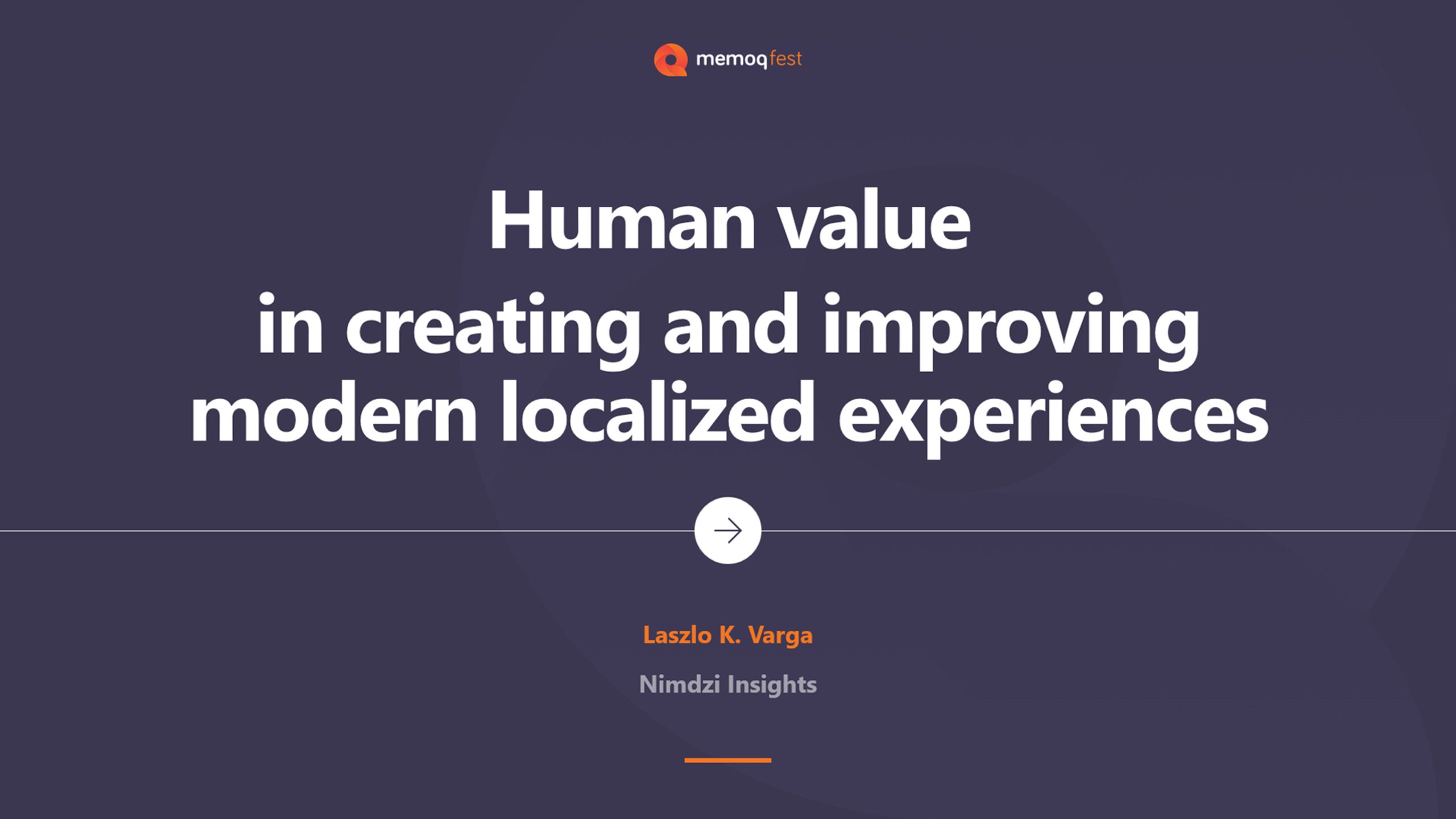

Lessons learned from writing 850 support requests (and why you should care)
I have written a LOT of support requests over the years. Some of these were requests for information, others bug reports, and still others requests for the memoQ team to take some action. I believe I have gotten better at writing these reports over time, but I didn’t used to be skilled at testing or bug reporting.
By sharing a combination of tips and tricks, inviting users to think like a software tester, and providing some real-world examples, I aim to inspire more users to create better-quality support requests that will be handled more quickly with fewer back-and-forths.


Coffee Break
Automate any language task with ChatGPT as a memoQ user
Current applications of Generative AI in the localization field primarily focus on refining raw machine translations by adapting and incorporating relevant matches or selections from translation memories and term bases. Yet, there is a vast potential to expand their utility beyond these uses, and it is also apparent that most of the currently available solutions neglect the critical role of user input in prompt engineering – a crucial aspect that can greatly enhance their effectiveness.
Addressing these gaps, this presentation unveils a user-empowered solution that allows memoQ users to leverage the ChatGPT API, arguably the most advanced language model (LLM) available for language tasks today.
The session is designed to be accessible to anyone interested in enhancing their workflow, no prior knowledge or technical expertise required.
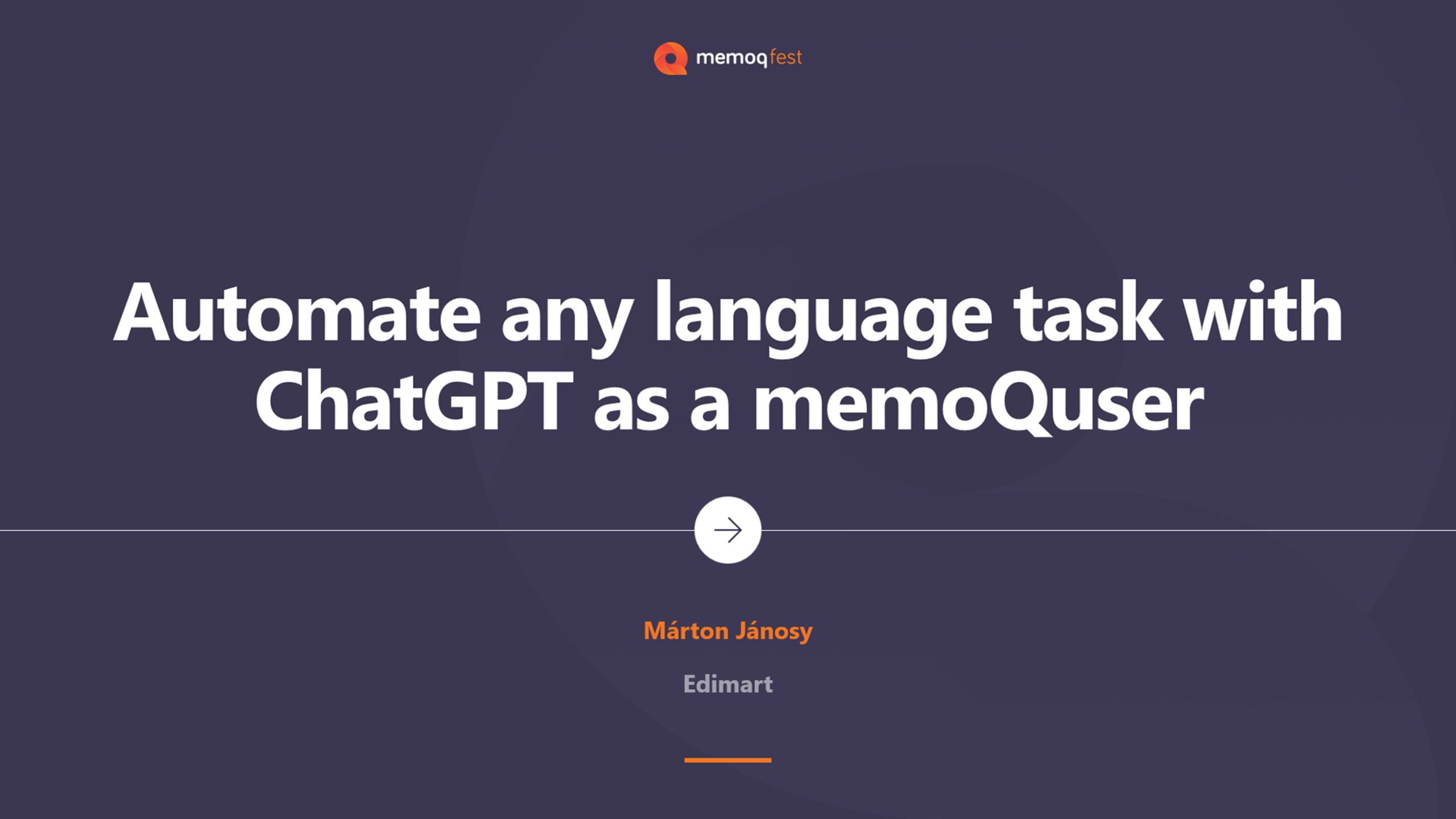

Streamlining the translation workflow for a Swiss online shop by integrating memoQ into the existing ERP system
Switzerland’s largest online shop, Digitec Galaxus, relies on an in-house Language Services team of 17 language specialists to translate all customer-facing content such as editorial articles and UX texts from German into English, French and Italian.
Editorial content is an important part of the online shops, as USP of the platforms, with 3,500+ articles published every year. To produce high-quality translations of this wealth of content, the Language Services team relies on automated and efficient tools and processes: With a self-made ERP system where content is saved, Atlassian’s JIRA to manage tasks and memoQ as a TMS of choice, the workflow includes interfaces between all three tools.
- In Jira: We have an integration that has been implemented by memoQ itself.
- In ERP: Our in-house product development team has implemented an automated workflow to import and export texts from ERP to memoQ and the other way around.
Our translation efficiency, measured in terms of translated text coverage, has increased from 60% per year to over 85%. Instead of copying and pasting a text into Word, importing it into memoQ, translating it and then exporting and pasting it into ERP, we only have to click exactly 5 times: import, select project, confirm, deliver, confirm. That’s it.
How does this work? Join us to get first-hand information about this solution!
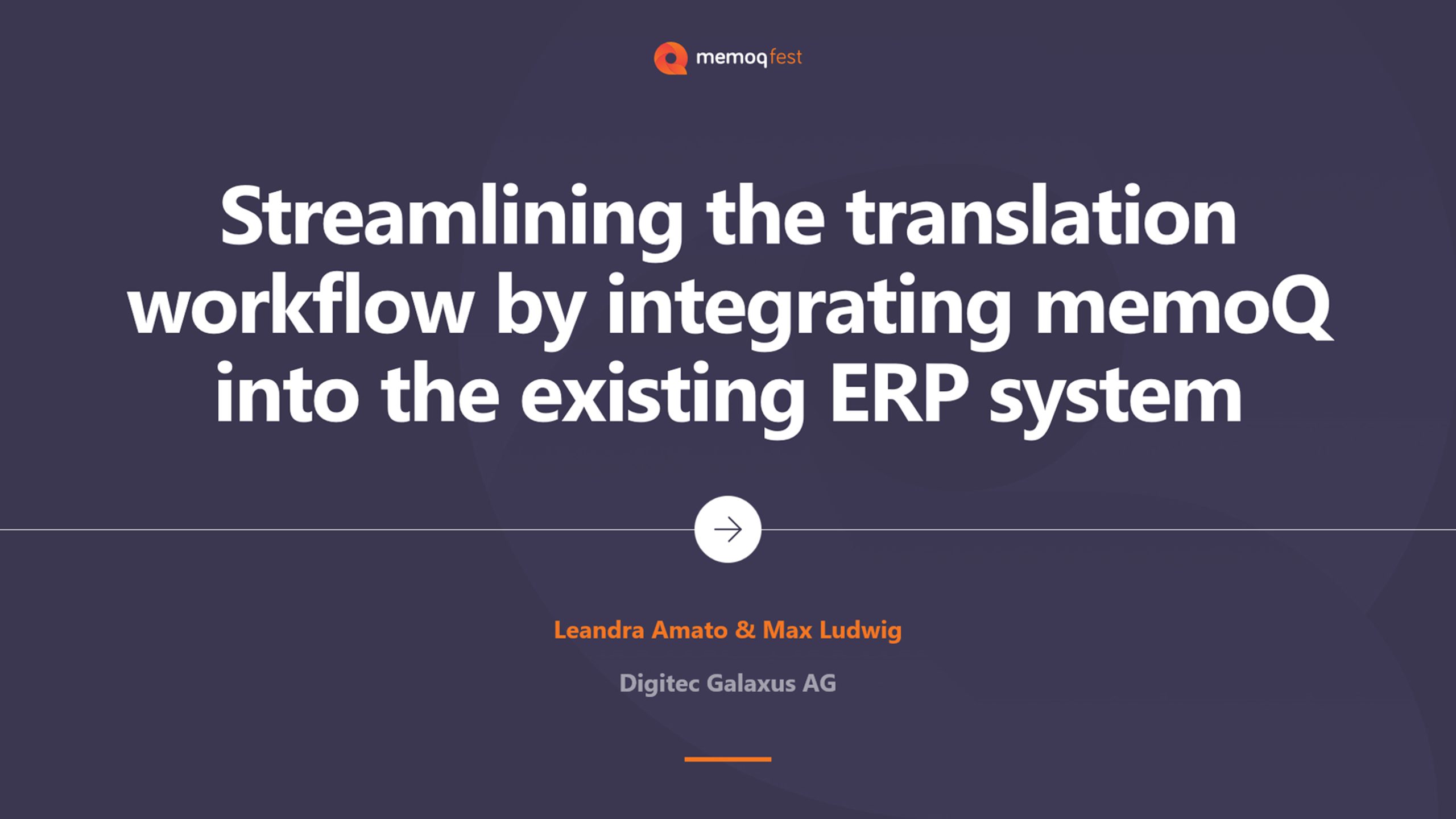
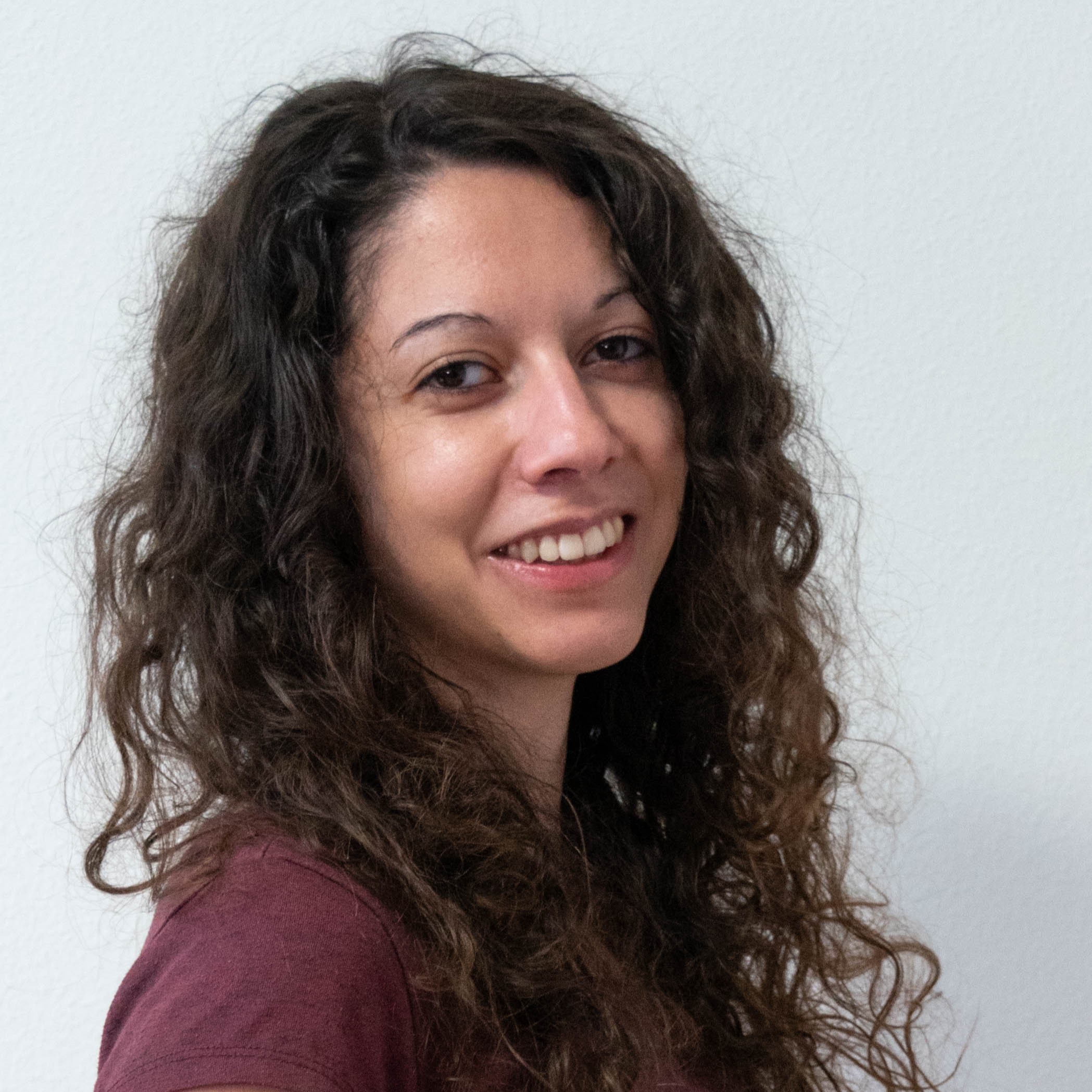
Integration Showcase | Integrations & custom solutions - what memoQ Business Services have been up to
memoQ Business Services team have been working on a range of integrations and customizations in the past year. This short session provides an overview of the available integration options, ongoing projects and other custom solutions – anything that can help to accelerate and simplify our customers’ work.
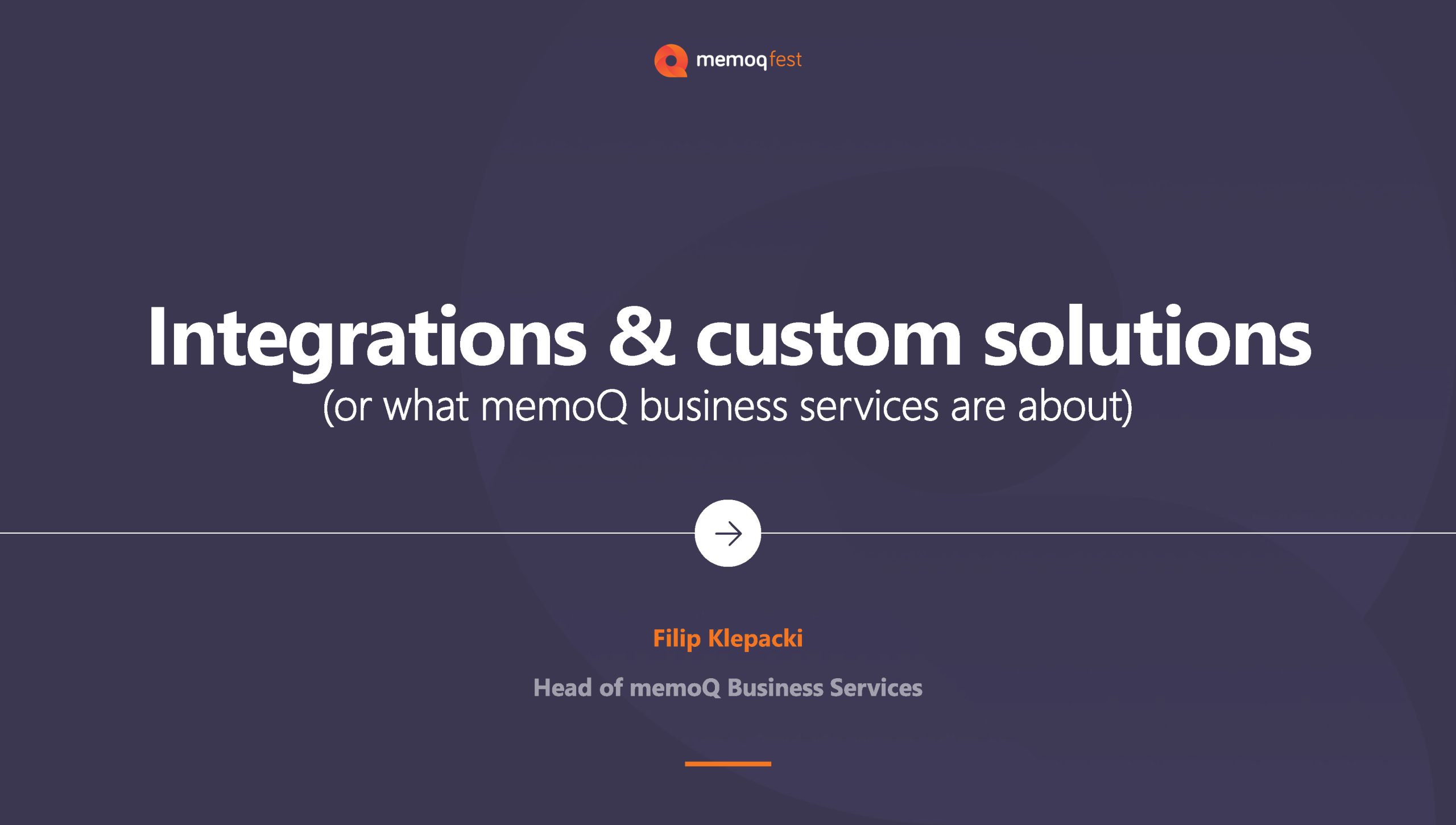

From Source to Voice: Designing a robust game localization ecosystem with memoQ
One of the biggest strengths of memoQ is its interoperability, which makes it a perfect cornerstone of our interconnected localization ecosystem. This ecosystem orchestrates the entire text authoring pipeline – from the inception of a new UI text string to its composition, translation into up to 17 languages, potential voice recording, and culminating in a meticulous in-context review.
The speakers will guide the audience through the evolution of this innovative ecosystem’s evolution since 2018. The journey takes you through the twists and turns, lessons learned, and strategic design decisions that cater to the diverse needs of UI designers, game writers, localization project managers, translators and linguistic testers.
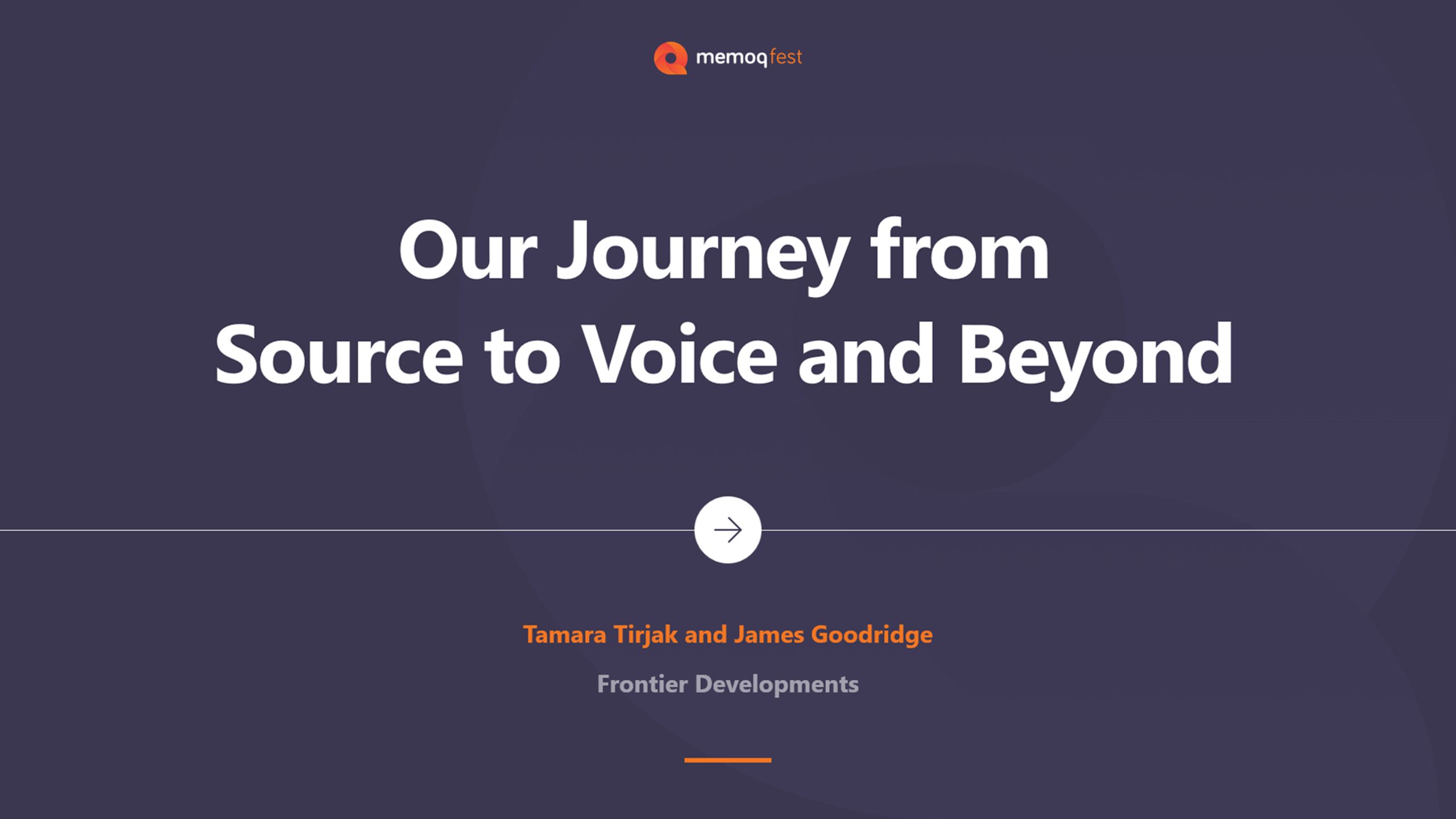


Templates with scripts
Automation with templates helps with project setup and moving the documents through the different workflow steps. But they can also be used to process the documents before import and after export. This way, document preparation (running macros on Office files, changing structure or segmentation points) and post-processing (undoing changes done by macros for preparation) can be automated, too.
Even the XLIFF files inside the translation project can be automatically processed with regular expressions using the FindAndReplace tool that comes with memoQ. This could be useful for example to lock certain segments automatically after import.
The possibilities are endless and the examples shown in this presentation are just meant as a starting point for your own imagination.
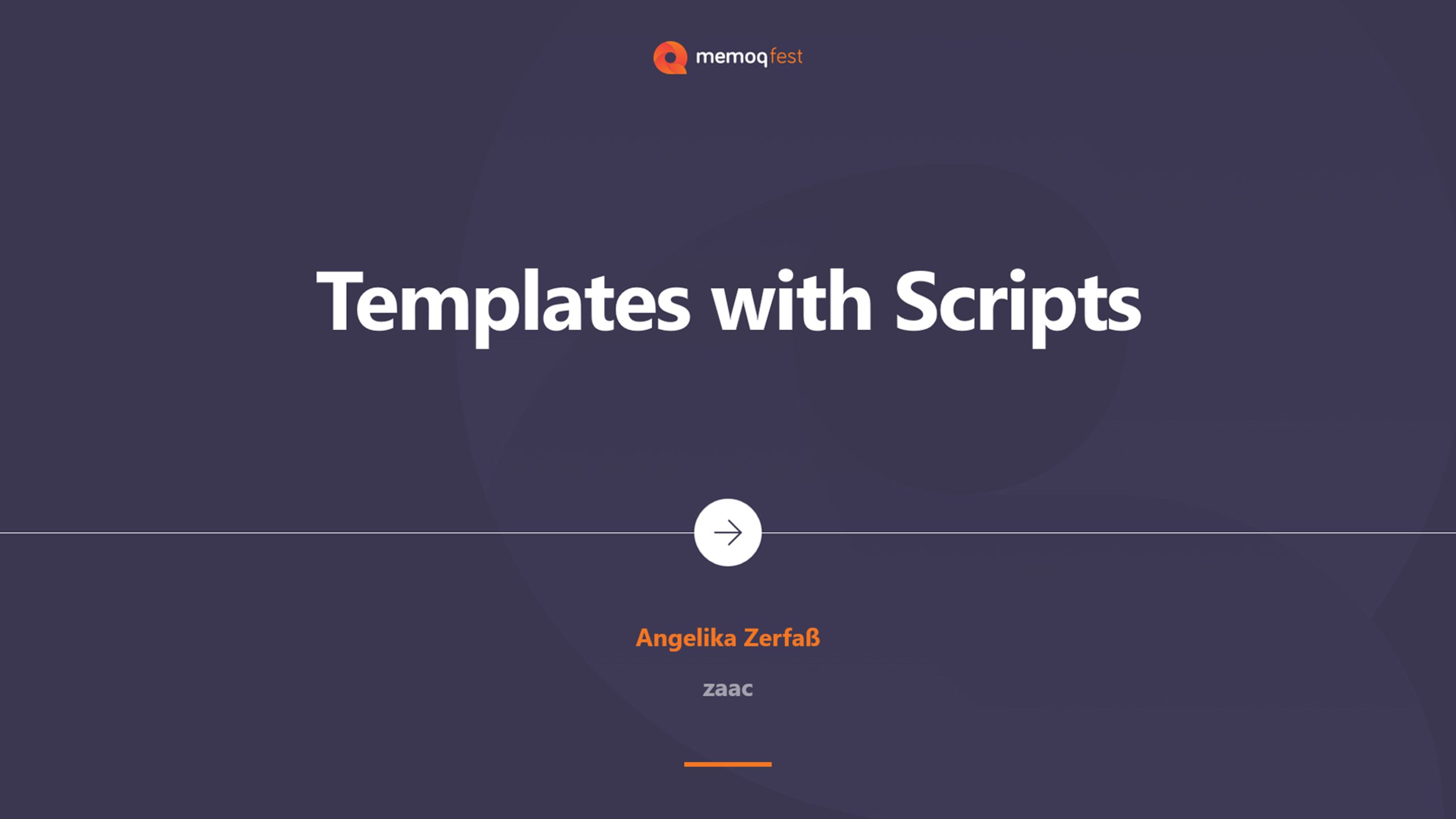

AI-driven technologies and workflows at AUTODOC with a special emphasis on the importance of humans
AI-driven technologies are revolutionising content creation at AUTODOC, offering unprecedented efficiency gains. While AI tools reshape content generation, human expertise remains indispensable. Our initial trials in mass content generation led to the development of a tool enabling the creation of up to 200 product descriptions per batch. However, challenges such as inconsistent quality emerged, prompting the adoption of hybrid copywriting.
This approach combines AI efficiency with human creativity, enhancing productivity and quality. The integration of AI-driven tools and human oversight has been pivotal. AUTODOC’s translation process, employing an MTPE approach with memoQ, DeepL and even AGT on a trial basis, ensures linguistic consistency. This fusion of human and AI heralds a new era of content creation, where creativity guides technology.
The presentation will delve deeper into these AI-driven processes, their benefits, and results.


BeLazy integration: Let memoQ TMS be the boss in business management!
This is the premiere of the new BeLazy Ledger Link set of functionalities with memoQ TMS. Have you ever thought how good it would be if you could just prepare a project in memoQ, with all its powerful template-based automation capabilities, do slicing, possibly even select the vendors, and have all of this data kept up-to-date in Plunet, XTRF or Protemos (or any other system), without even logging in?
Well, that’s Ledger Link, because memoQ will do wonders but won’t do your invoices and POs.
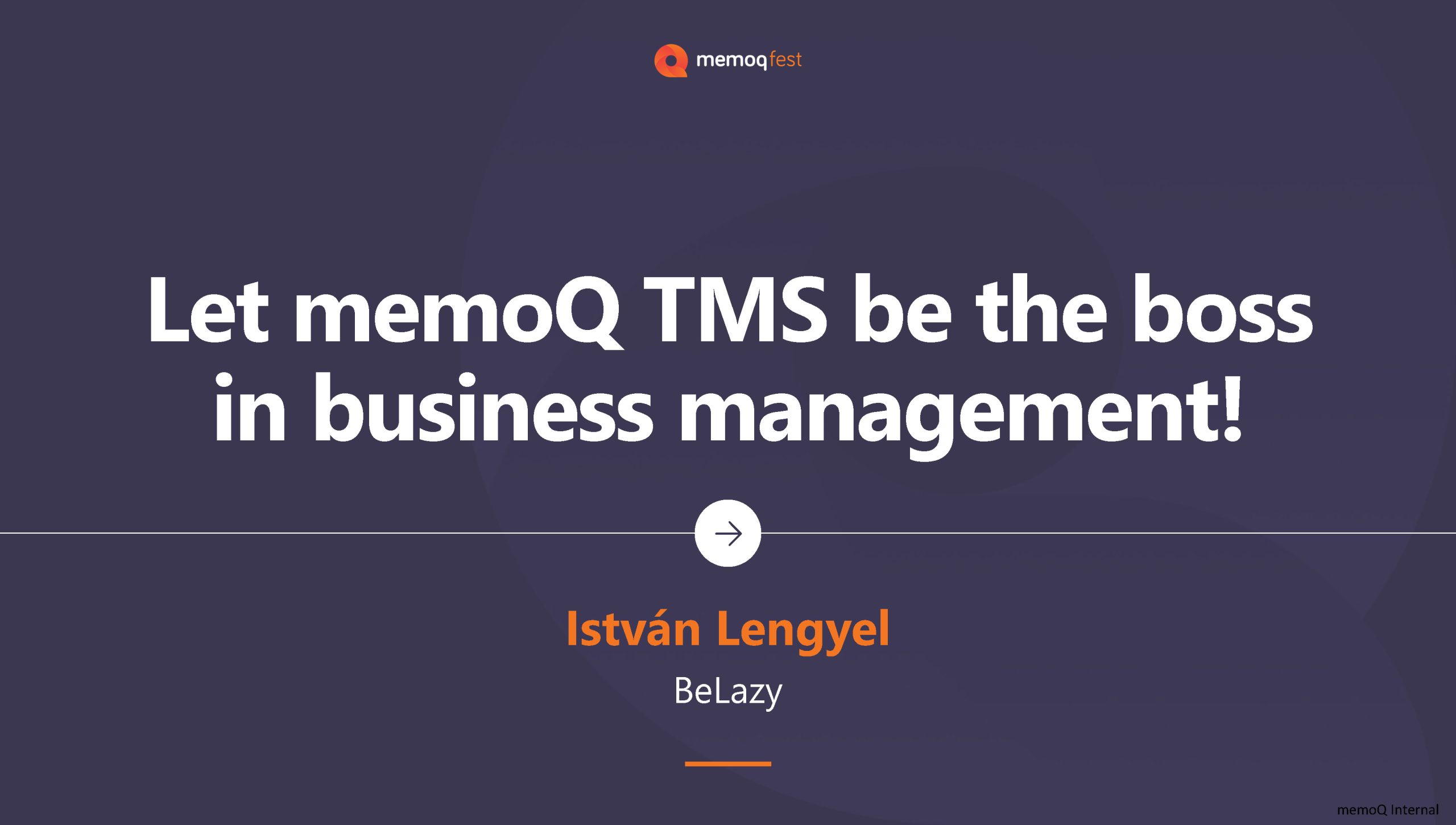

The memoQ Mission: The Games Global Odyssey
Embark on an extraordinary journey with us at Games Global, a front-runner in the iGaming industry with a footprint across the globe, as we demystify the complexities of migrating a Translation Management System (TMS). In this invigorating presentation, I, as the Localisation Product Manager spearheading this ambitious project, will illuminate the challenges, breakthroughs, and unparalleled opportunities that defined our transition.
From overcoming the constraints of memoQ to pioneering solutions that set new industry benchmarks, this session is a treasure trove of insights for anyone at the crossroads of a TMS migration, contemplating their next move, or seeking to pre-empt potential pitfalls.
Discover the strategies that not only navigated us through turbulent waters but also propelled us towards operational excellence and risk mitigation.
Your takeaway will be a blueprint of innovation, resilience, and forward-thinking that promises to redefine your approach to TMS migration.
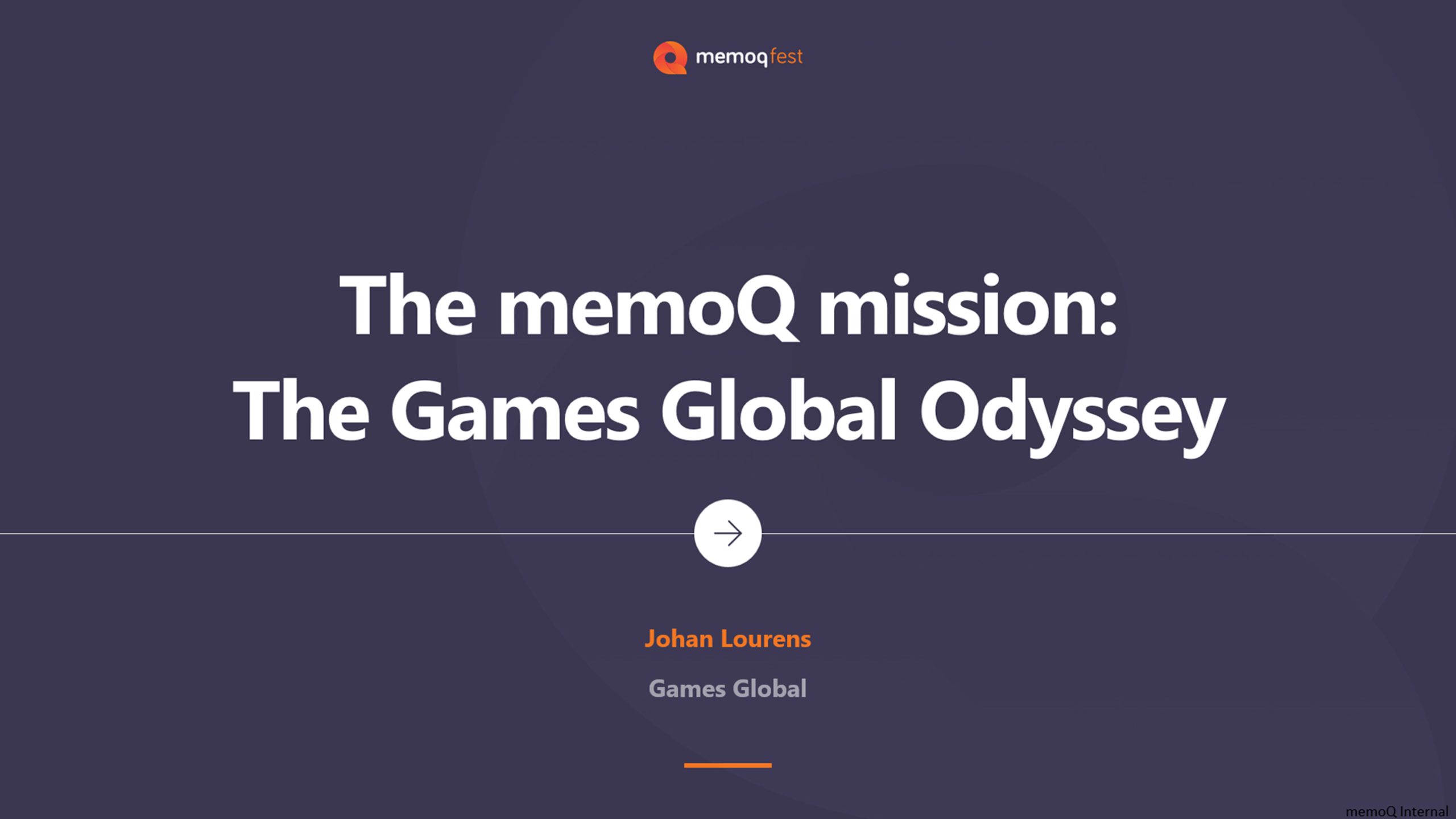

Do you know how you are messing up your project in memoQ
The presentation will cover practical examples of “how you might be doing it”-s and “don’t”-s when setting up a project in memoQ. Things you should look after, small details you should notice, small things that can greatly impact a project, especially on the long run.
This presentation will feature best practices for having a consistent approach and a beneficial approach as well to setting up your projects in memoQ towards cost and quality optimization.
Having a good start in an ongoing project counts extremely much in the overall progression of that specific project. Much more than you would imagine, and the smallest details can cause the biggest problems.
- Segmentation rules – many are not that aware of the importance of this light resource, that weighs much more.
- Filter settings that cause different segmentations in the file.
- Special characters – quotes, dashes.
- Diacritics (or lack of) in the source language.
- What’s the actual source language?
- Did you convert the files from PDFs? Are you sure it’s ok?
- TAG conversion of certain elements – what a beautiful and powerful thing to use. But do you do it consistently?
- Do you know what dark horrors hide in your TM?
Join Cristi Rosu to get some hands-on tips and tricks on how to best use memoQ.
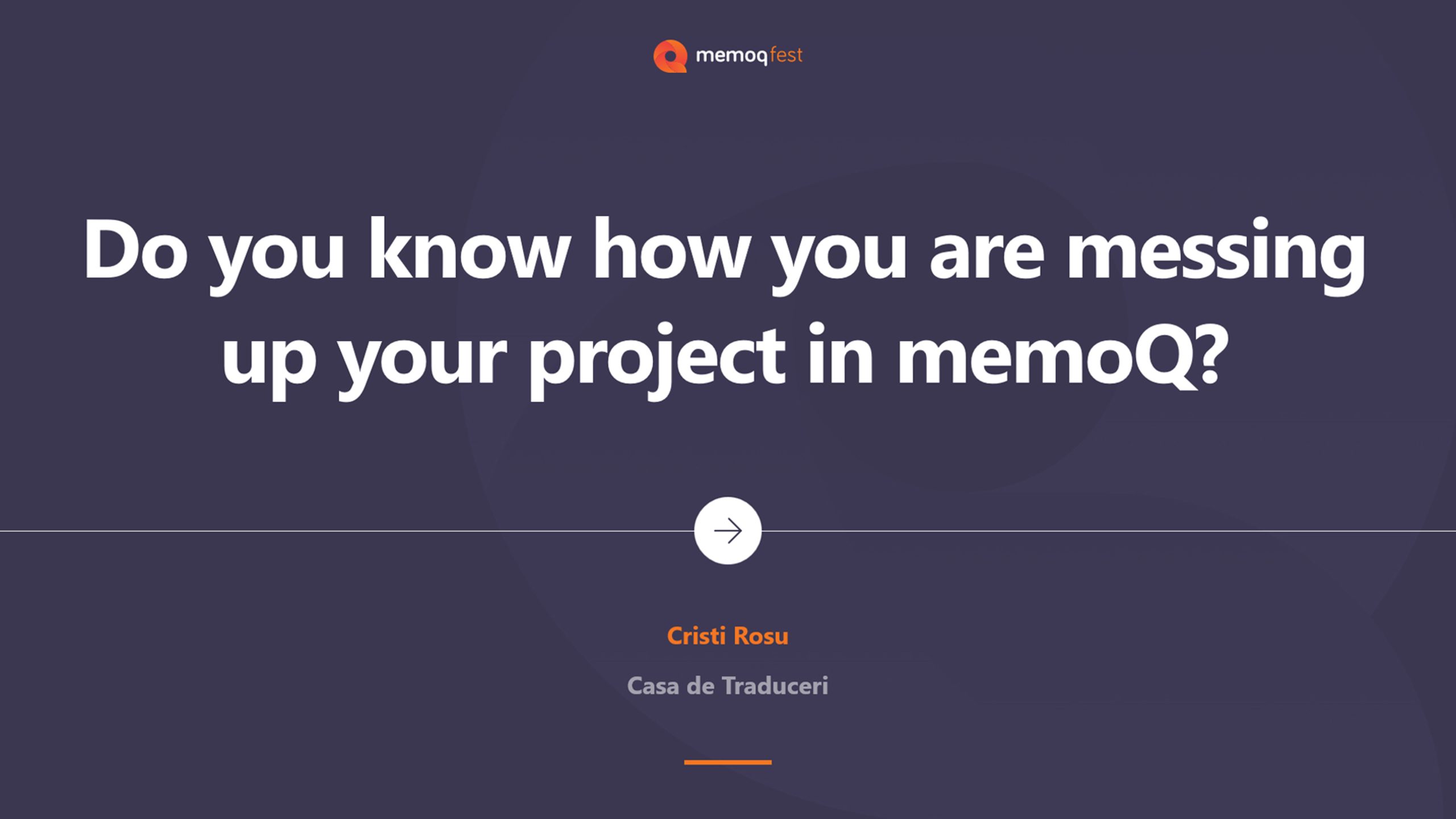

Dealing with InDesign
InDesign documents present the translator with a number of challenges. A knowledge of the IDML filter and of the features in InDesign that it takes account of is vital to producing a result that will be acceptable to the end customer.
The presentation will focus on using the filter settings to achieve an optimum result and to show how to recognize and deal with some common problems. It will also explain why it makes sense to have InDesign when you translate InDesign files and what you can do if you don’t have it.
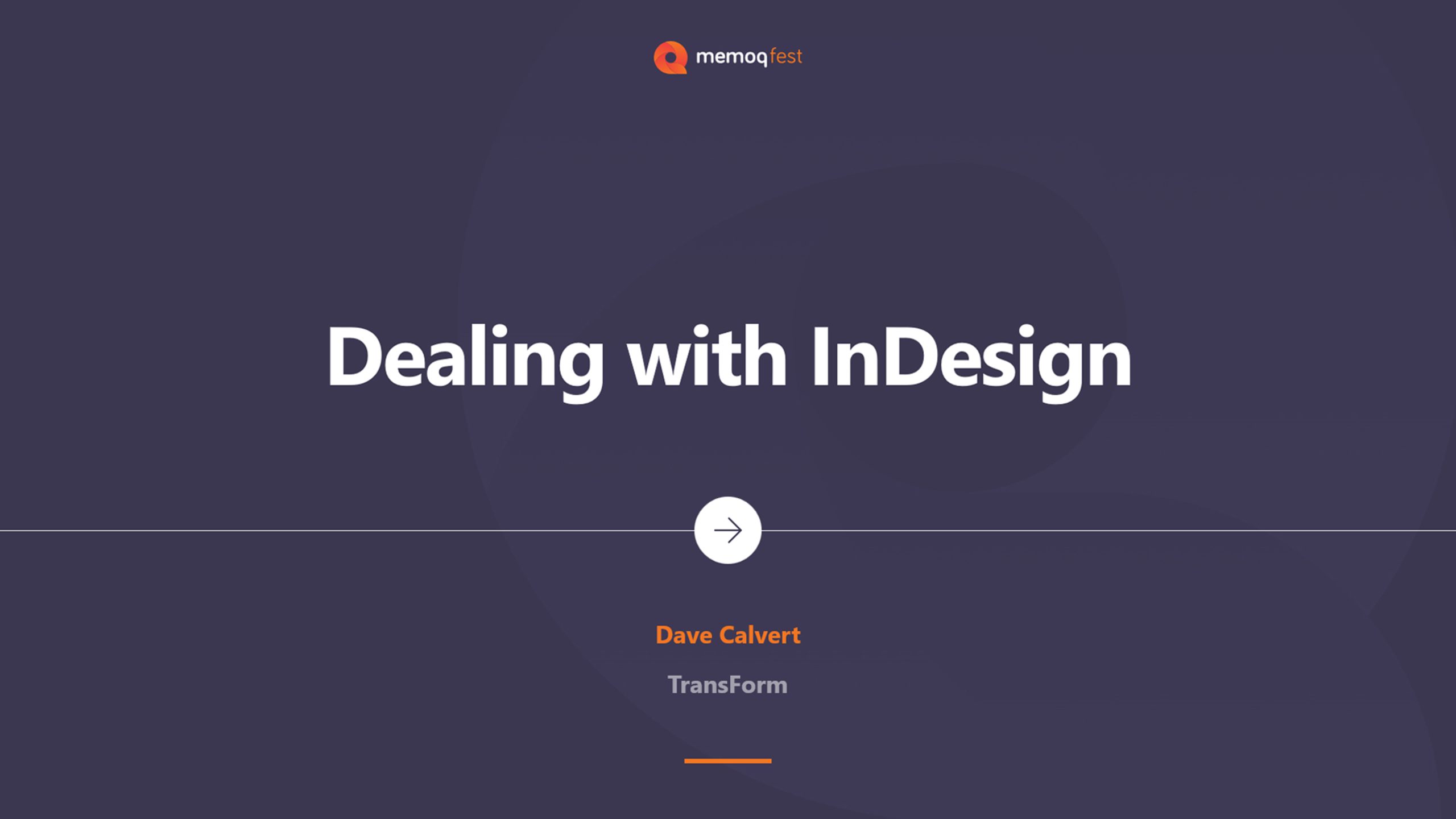
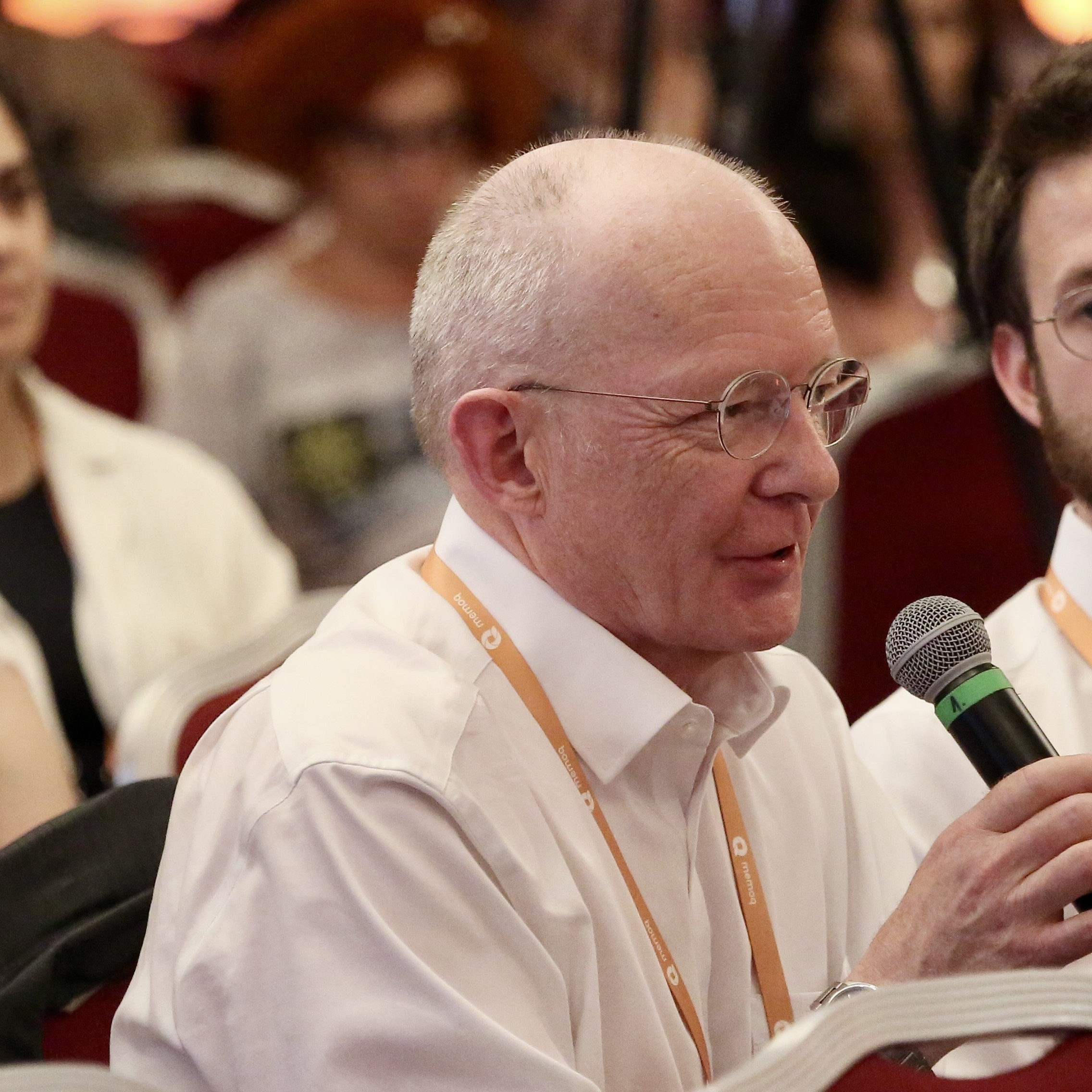
Integration Showcase | Streamline Success: FlowFit and memoQ in Perfect Harmony
Join us for this session as Consoltec presents the seamless integration of FlowFit with memoQ, showcasing not only the technological aspects but also the compelling business benefits for our joint customers. Explore how this dynamic integration provides a comprehensive solution for managing translation projects while delivering a unique user experience.
Discover how this powerful combination optimizes workflows, fosters collaboration, and significantly boosts efficiency throughout the localization process.
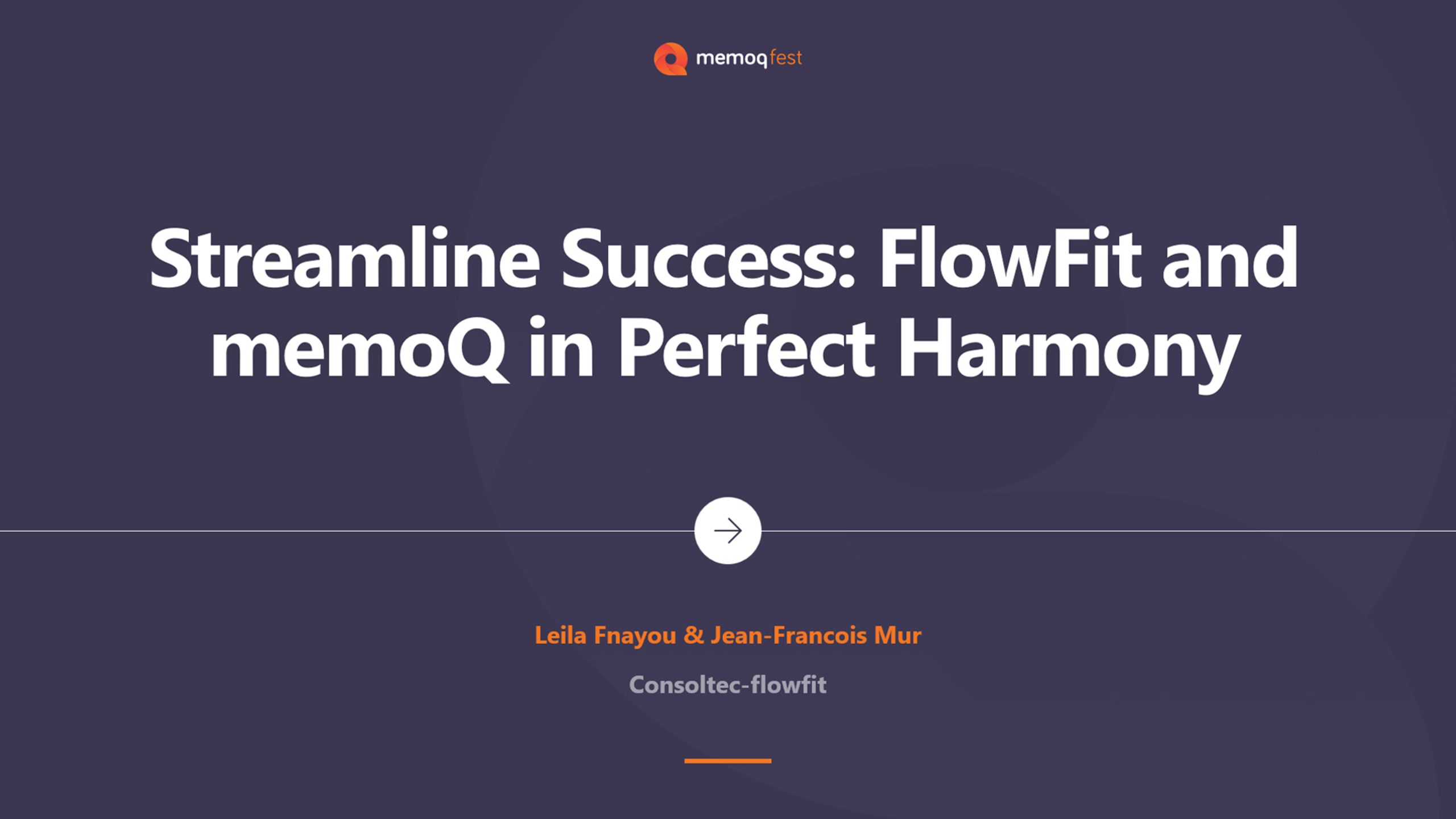


memoQ views: speeding up the snail-paced handling of complex XML files
The client presents a unique challenge that requires a sophisticated approach to manage their multi-product XML files, which contain multiple products each accompanied by corresponding comments. The client’s requirement is to have separate Translation memories and therefore individual memoQ projects for each product, yet the translation output must be consolidated into a single XML file, one per language.
To address this challenge, we propose a session to showcase the unique use of memoQ views to speed up the otherwise tedious process.
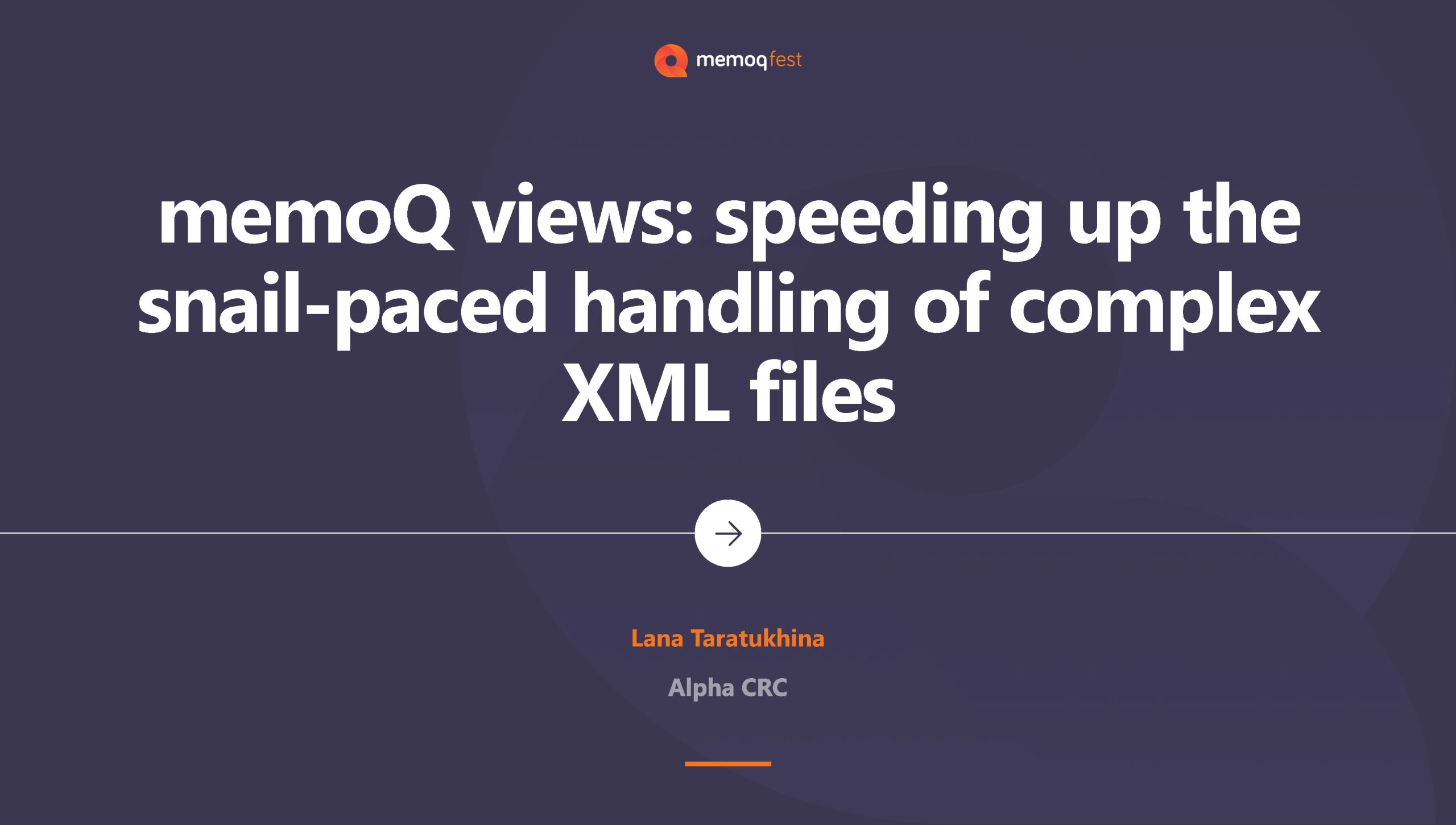

Lunch & Networking
Master Class: Using light resources to make the most out of your projects
Many believe that heavy resources are the essentials for delivering translation projects in a timely and cost-efficient way. They are right because this is the core every project is built on.
However, understanding and fine-tuning light resources would help further optimize your projects and workflows, and help improve your ROI, too.
Join a great team of memoQ solution engineers and learn more about
- Light resources on file level
- segmentation rules & export path rules
- Light resources during translation
- auto-translation rules, keyboard shortcuts
- AutoCorrect lists, Ignore lists, WebSearch
- Light resources for terminology
- non-translatables
- stop word lists
- Light resources for resources
- TM settings
- LiveDocs Settings
- Light resources for quality
- Linguistic Quality Assurance
Target audience: project managers and freelance translators | Level of memoQ knowledge required: basic / intermediate / advanced






Master Class: Regex 101
The problem most people have when it comes to regexes is that they look somewhat scary and mysterious. In reality, once you know the meaning of symbols used and some basic rules, most of the time regexes are quite simple and logical. The workshop is designed to introduce regular expressions to anyone without prior knowledge and provide help and inspiration for people with basic to intermediate knowledge. We will start off from the very basics up to relatively complex rules with emphasis on translation-related applications, based on real-life problems and files.
Target audience: project managers and freelance translators | Level of memoQ knowledge required: intermediate / advanced

Master Class: let memoQ's Business Services Team take your custom workflows to the next level
memoQ’s Business Services Team helps memoQ TMS users to create custom integrations, optimize their workflows, and build solutions that improve their ROI and differentiate our partners from their competition.
In this session language engineers and server admins will see use cases and examples from the previous projects of the Business Services Unit.
We will use this platform as a forum to discuss further requests, ideas and possible solutions.
Target audience: language engineers, server administrators | Level of knowledge required: advanced/engineer

Master Class: Import file filter settings beyond the defaults
In this session, translators and project managers will go beyond the basics and learn how they can make the most out of memoQ’s import file filter settings – starting from the basics through going into settings you don’t use on a daily basis (though they can make your life much easier)!
Target audience: project managers and freelance translators | Level of memoQ knowledge required: intermediate / advanced

Well-being workshop with special emphasis on resilience

Coffee Break
The Next 'New Normal' for Language Services
In these dire times of strife and stress, we face yet another pandemic: AI-generated content. Language professionals have the most relevant expertise to shape and mold it into something useful – and to stop it from undermining our clients and their customers’ success. For this session, I will offer an objective analysis of the state of the art which will be useful as we consider our options. What are the real threats genAI poses and the weaknesses it exposes? How will AI warp and twist today’s market for language services? What strengths can we draw on as a profession to create new opportunities? AI is awash in investments, so many more innovations — like knowledge graphs and multimodal LLMs — are in the works. With this, we can start to rethink our strategies and prepare for the next ‘new normal’ now.
